14900K vs 7950X: Intel and AMD's flagship CPUs go head to head
Which flagship processor between Intel's 14900K and 7950X from AMD is right for you?
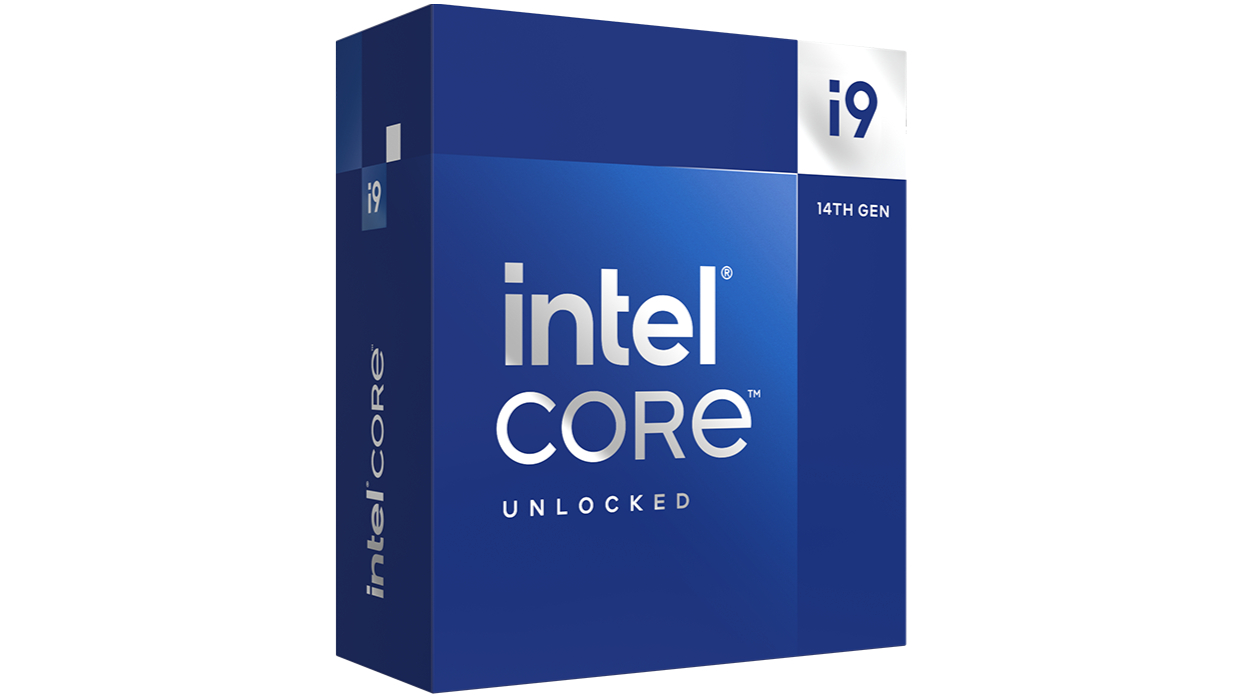
Efficiency Cores: 16
Performance Cores: 8
Threads: 32
Base Clock (E-Cores): 2.4 GHz
Base Clock (P-Cores): 3.3 GHz
Boost Clock (E-Cores): 4.4 GHz
Boost Clock (P-Cores): 5.6 GHz
Total Cache: 68MB
TDP: 125W
Intel's latest flagship processor is the best performing chip we've tested yet, but is its performance enough to make the switch from AMD, or are you better off with Team Red?
Pros
- Best-in-class performance (barely)
- No price increase
- Very low idle power usage
- Can go as high as 6.0GHz
Cons
- Barely any gen-on-gen improvement
- Gets extremely hot
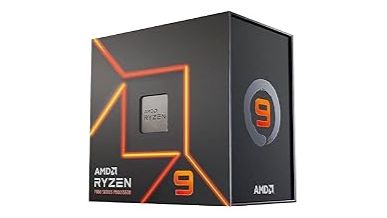
Efficiency Cores: N/A
Performance Cores: 16
Threads: 32
Base Clock: 4.5 GHz
Boost Clock: 5.7 GHz
Cache: 80MB Total
TDP: 170W
The AMD Ryzen 9 7950X is a massive jump over its predecessor and comes in at a lower cost, but that's off set by the new hardware you'll need just to use it. It's the best processor in AMD's lineup, but is it a match for Intel's latest flagship CPU?
Pros
- Great overall performance
- DDR5 support
- Excellent energy efficiency
Cons
- Requires AM5 motherboard
- No DDR4 compatibility
- No 3D V-Cache
If you’re in the market to build a bleeding-edge gaming PC in 2023 then you’ll want to compare 14900K vs 7950X. Team Blue and Team Red have all-star options for those power-users after enthusiast-grade performance, and we’re comparing them based on our own in-house testing to help you make the right call.
Both CPUs can be considered the best processors of their respective generation with leading performance where it matters most. We’ve said excellent things about the AMD Ryzen 9 7950X in our 4.5-star review saying that: “team Red retakes the lead with its best CPU ever” so Intel certainly has its work cut out for it. However, this chipset launched a year ago, with the Intel Core i9-14900K fresh on the scene, so the script could be flipped.
Let’s get one thing straight, processors are an investment and this is especially true at the top-end of the pricing spectrum. After all, if you’re thinking of spending up to $600 / £450 / AU$870 on a single component then it needs to justify its price tag with strong results. That’s why we’re going in-depth to compare 14900K vs 7950X so you can make an informed purchasing decision, because it’s not quite as straightforward as it may seem on the surface.
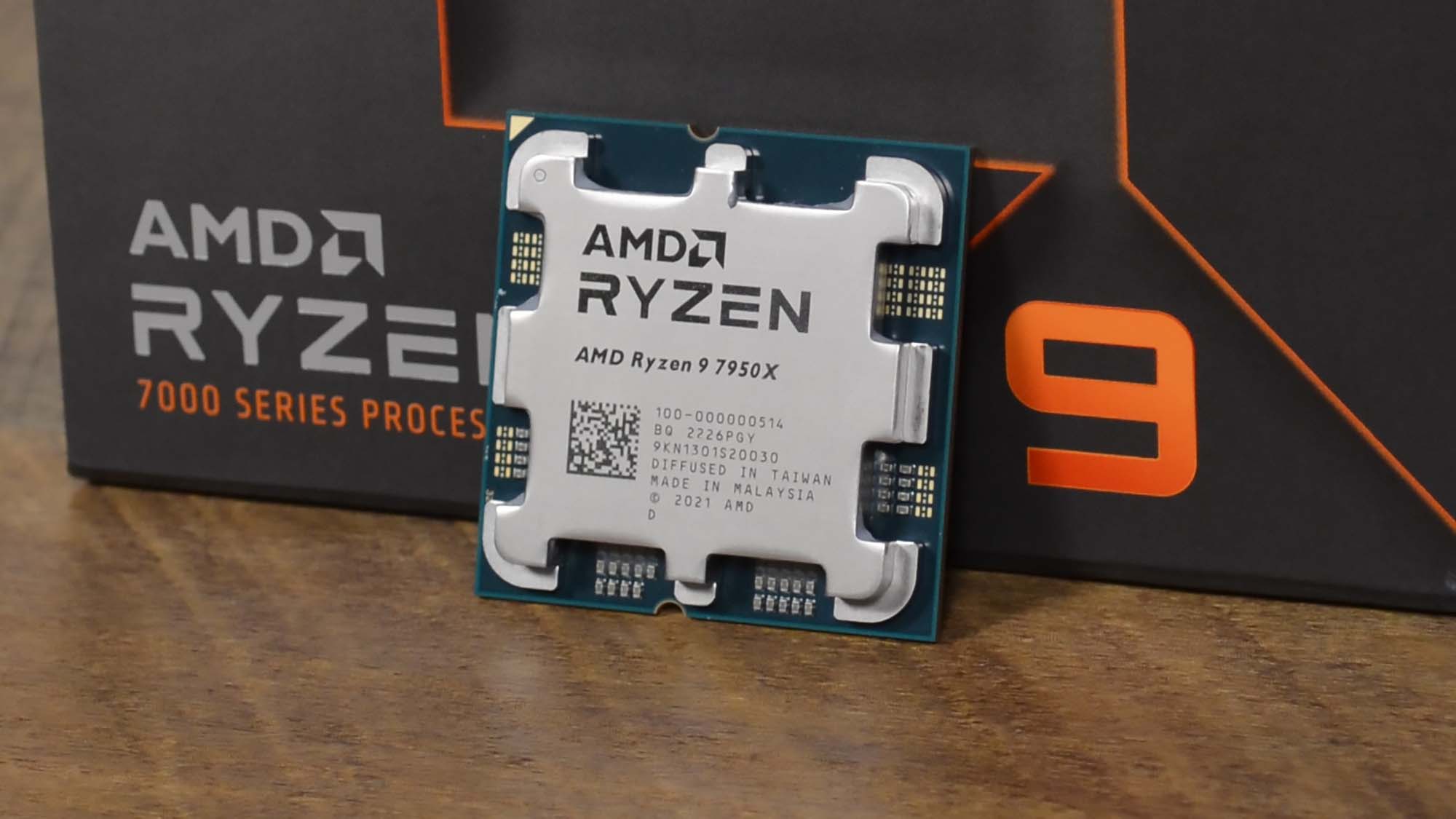
14900K vs 7950X: Price
The flagship offerings from Intel and AMD don’t exactly come cheap, so keep that in mind when pricing up 14900K vs 7950X from the jump. You can expect to pay $589 / £448 / AU$854 for the Intel Core i9-14900K, which is the same price as the previous-generation Intel Core i9-13900K from last year in the US, the UK, and Australia.
In comparison, the AMD Ryzen 9 7950X currently retails for $599 / £455 / AU$869 making it the more expensive of the two, albeit not by much. There’s about a 2% price difference between the two top-end CPUs. A key point of comparison for both models in terms of price comparison is the cost of upgrading, that’s because AMD’s latest runs on the new AM5 socket and exclusively requires the best DDR5 RAM. This is opposed to the 14900K which uses the same LGA 1700 socket as the two previous generations with the choice of the latest RAM and DDR4 memory, too.
As for which chipset offers the best value for money, the answer isn’t as clear as with other processor comparisons. Given their near identical pricing in the US, the UK, and Australia, it all comes down to the price-to-performance, which we’ll get into further down the page. In short, though, you’re getting more cores and a higher total boost clock with the 14900K overall, so Intel’s newest model takes the edge in this respect.
- Winner: Intel Core i9-14900K
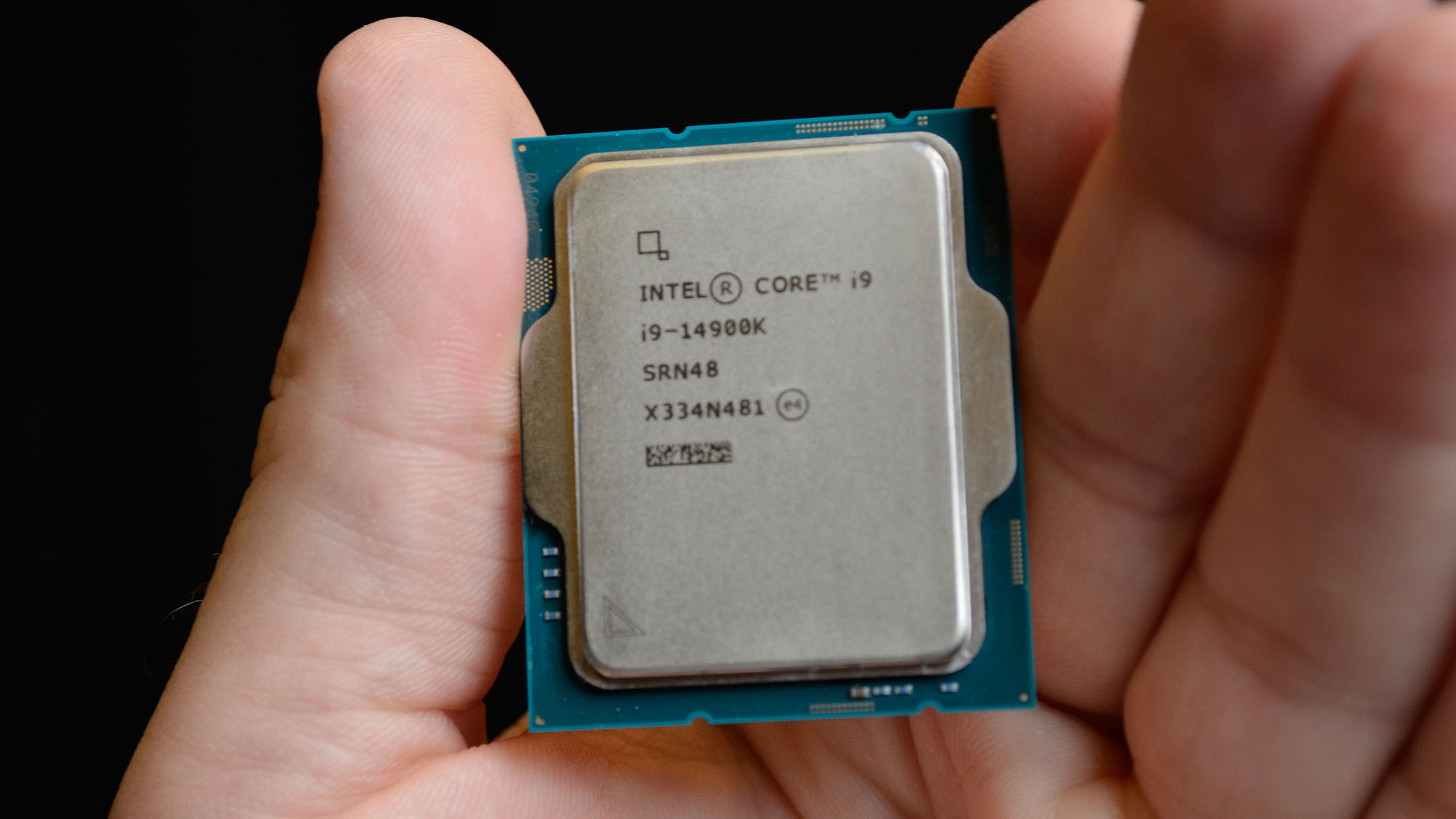
14900K vs 7950X: Specs & features
There are sweeping architectural differences between the Intel Core i9-14900K and the AMD Ryzen 9 7950X with the former being the third-generation hybrid architecture, and the latter being built on the all new Zen 4 5nm process. Below we’ve outlined all the differences from total core count, clock speeds, threads, TDP, and everything else you need to know at a glance.
Sign up for breaking news, reviews, opinion, top tech deals, and more.
The main takeaways here are that the AMD Ryzen 9 7950X runs faster straight out of the box with 16 cores all clocked at 4.5 GHz, with the potential to get as fast as 5.7 GHz. In contrast, Intel uses the P-cores and E-cores, with them both working in tandem with varying clock speeds. The base clock speed of both is considerably lower than AMD’s offering, but the third-generation P-cores can go as high as 6.0 GHz under limited circumstances, but normally max out at 5.6GHz.
| Header Cell - Column 0 | Intel Core i9-14900K | AMD Ryzen 9 7950X |
|---|---|---|
| Performance Cores | 8 | 16 |
| Efficiency Cores | 16 | 0 |
| Threads | 32 | 32 |
| P-Core Base Clock | 3.20GHz | 3.50GHz |
| P-Core Boost Clock | 5.60GHz | 5.10GHz |
| E-Core Base Clock | 2.20GHz | N/A |
| E-Core Boost Clock | 4.40GHz | N/A |
| L3 Cache | 36MB | 80MB |
| TDP | 125W | 170W |
| Socket | LGA 1700 | LGA 1700 |
| Max Temp | 100ºC | 95ºC |
- Winner: Intel Core i9-14900K
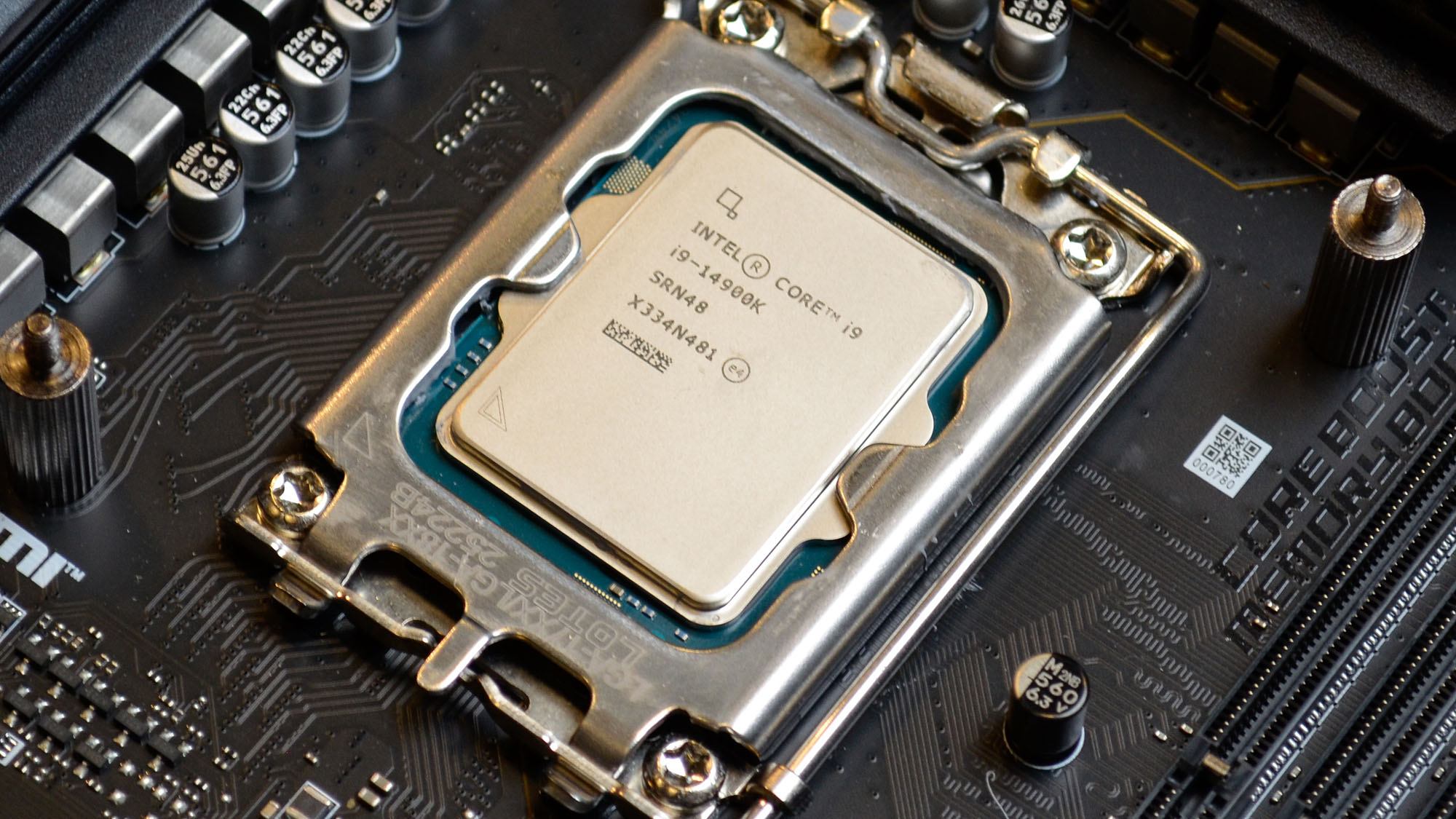
14900K vs 7950X: Performance
This is what it all comes down to in terms of 14900K vs 7950X, how both of the leading processors from both companies compare performance wise. In our industry-standard synthetic benchmarks, there isn’t a clear winner across the board as each chip boasts advantages in single-core and multi-core tests.
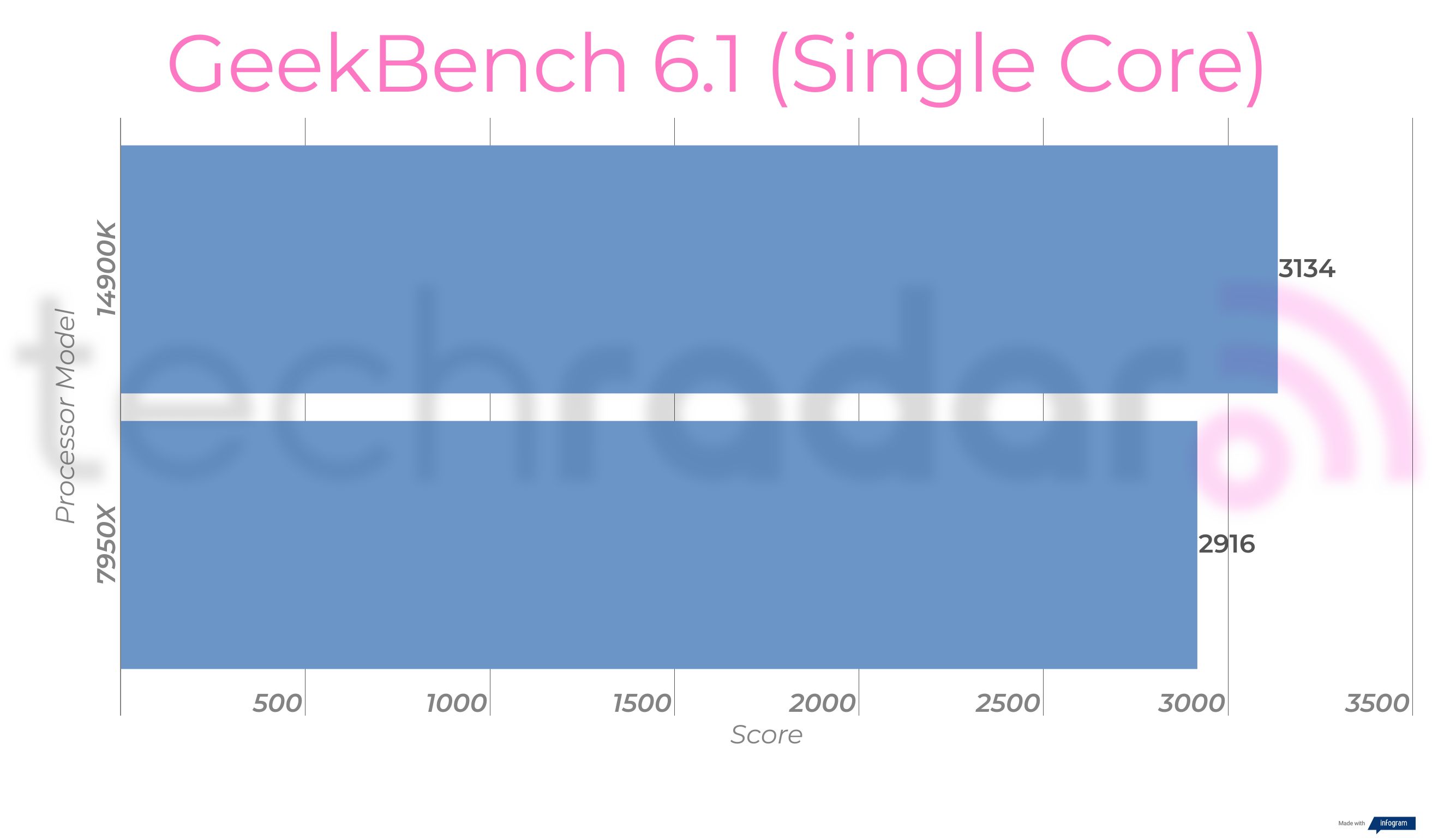
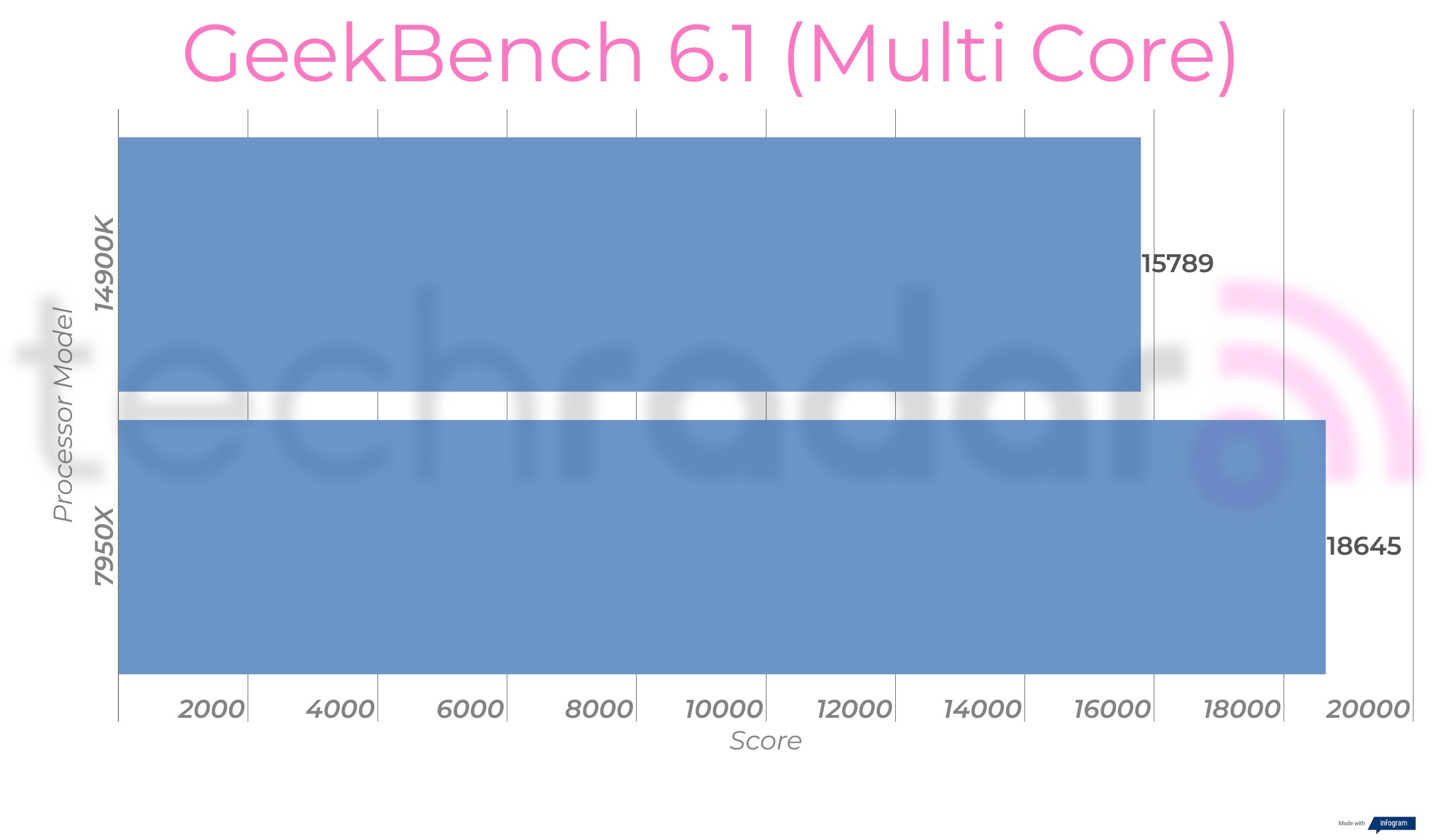
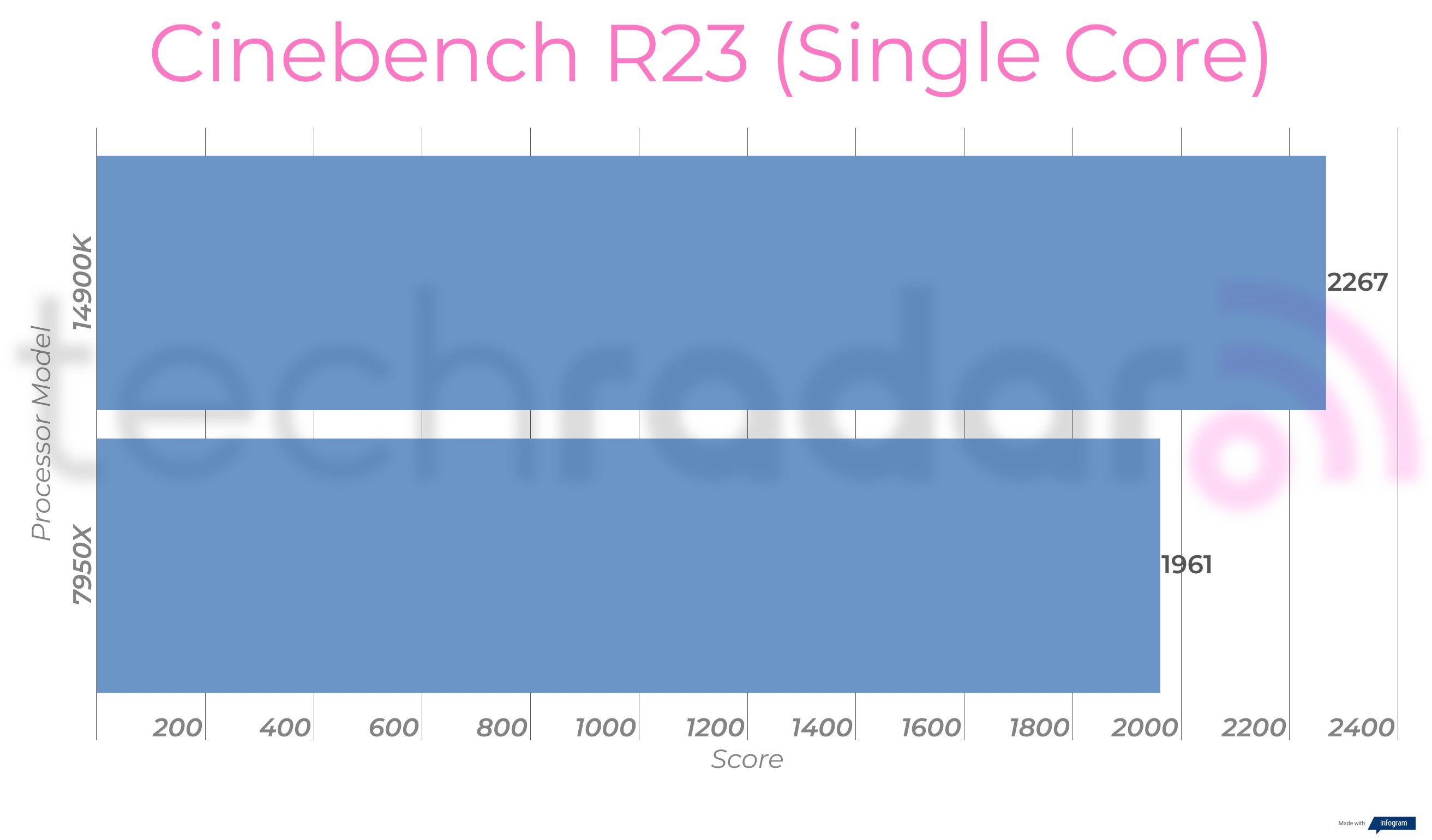
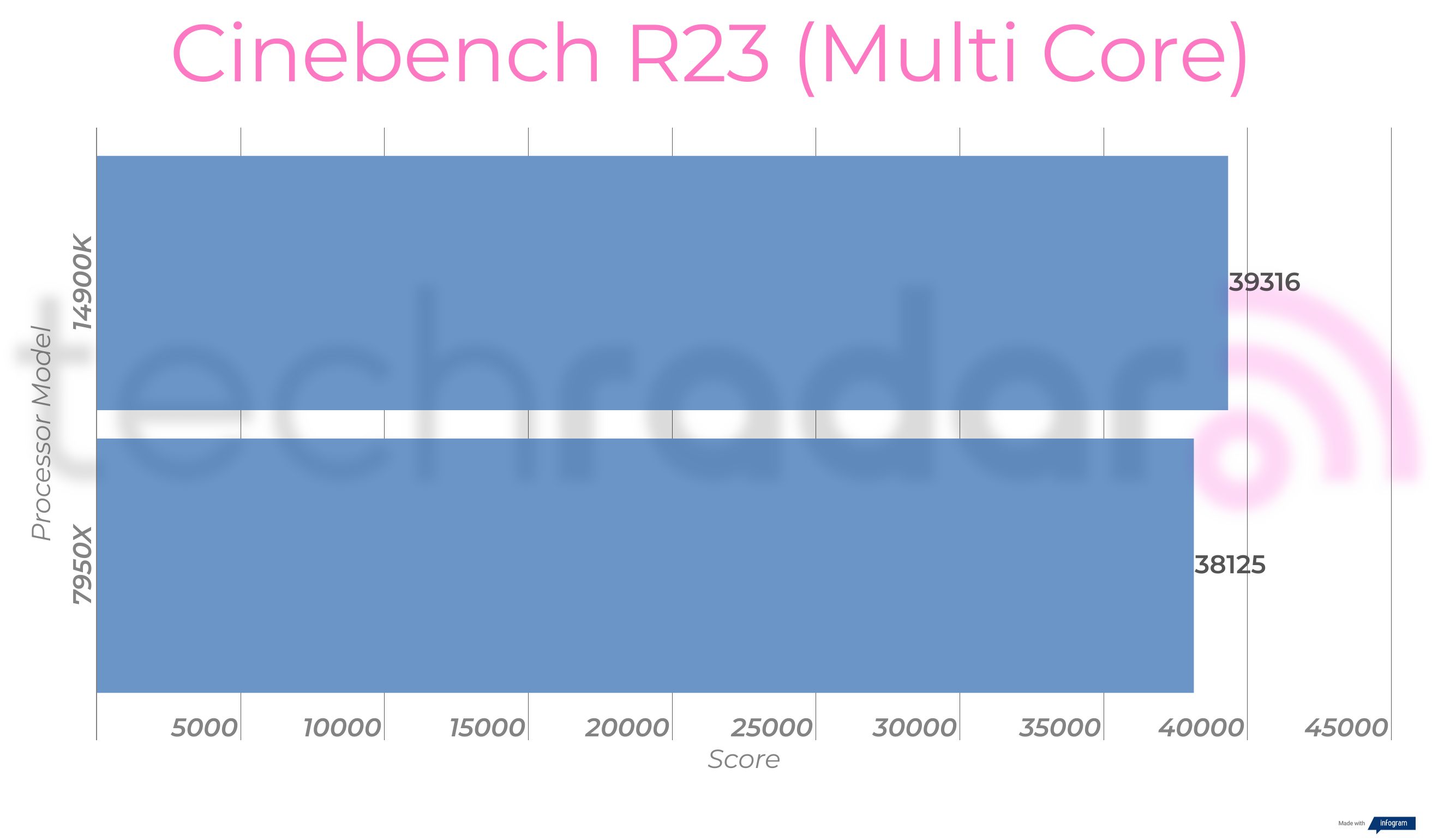
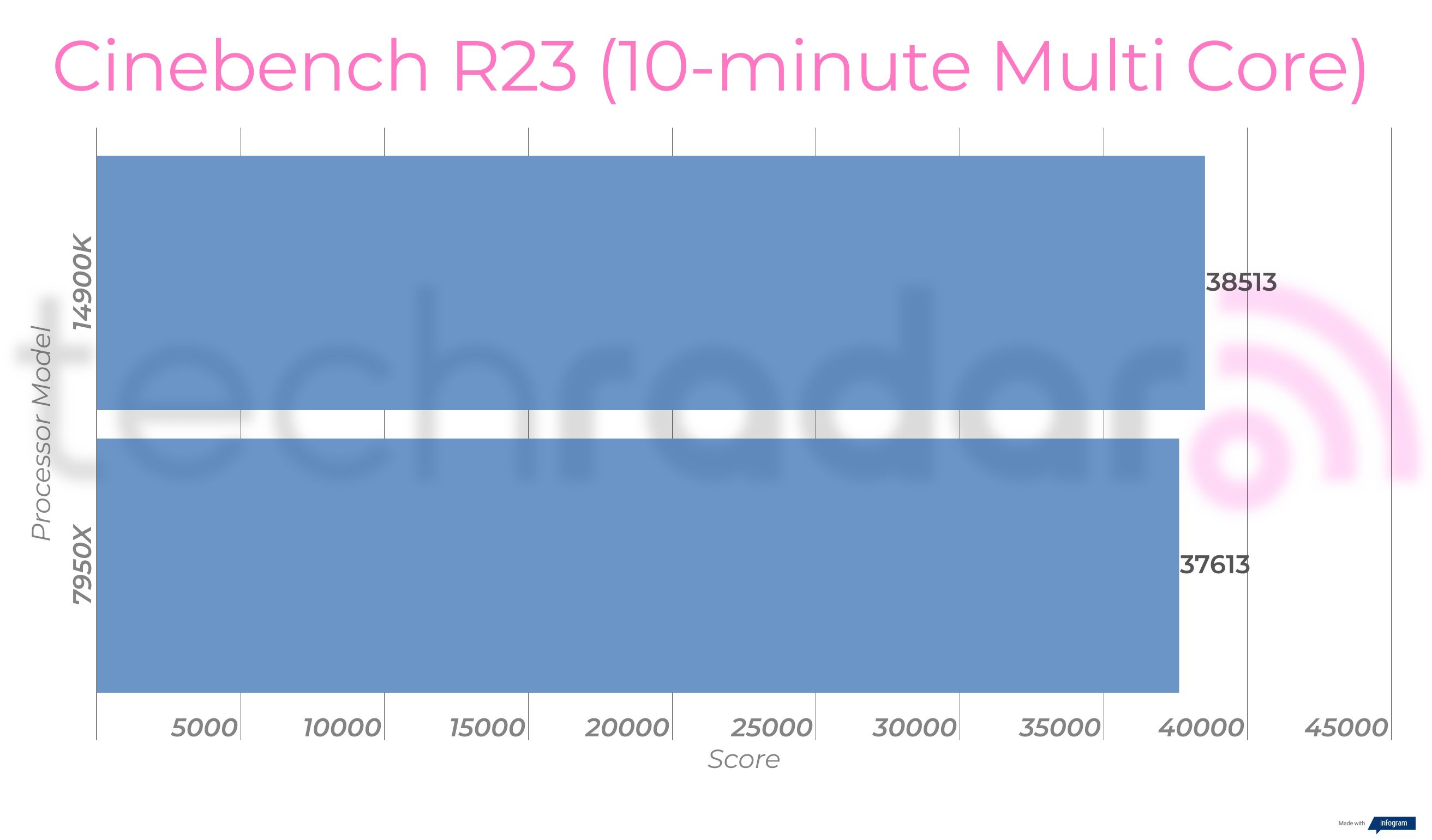
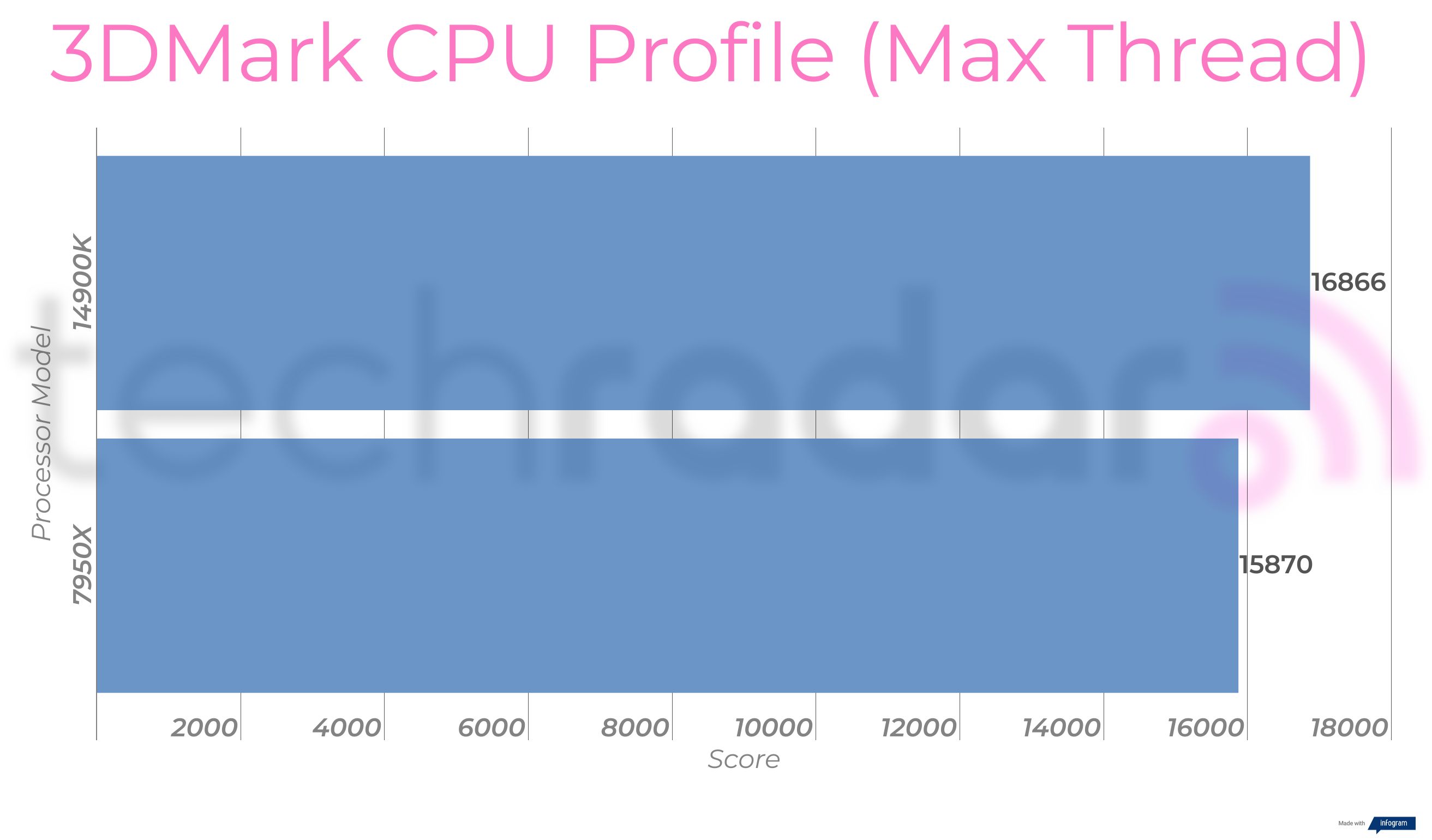
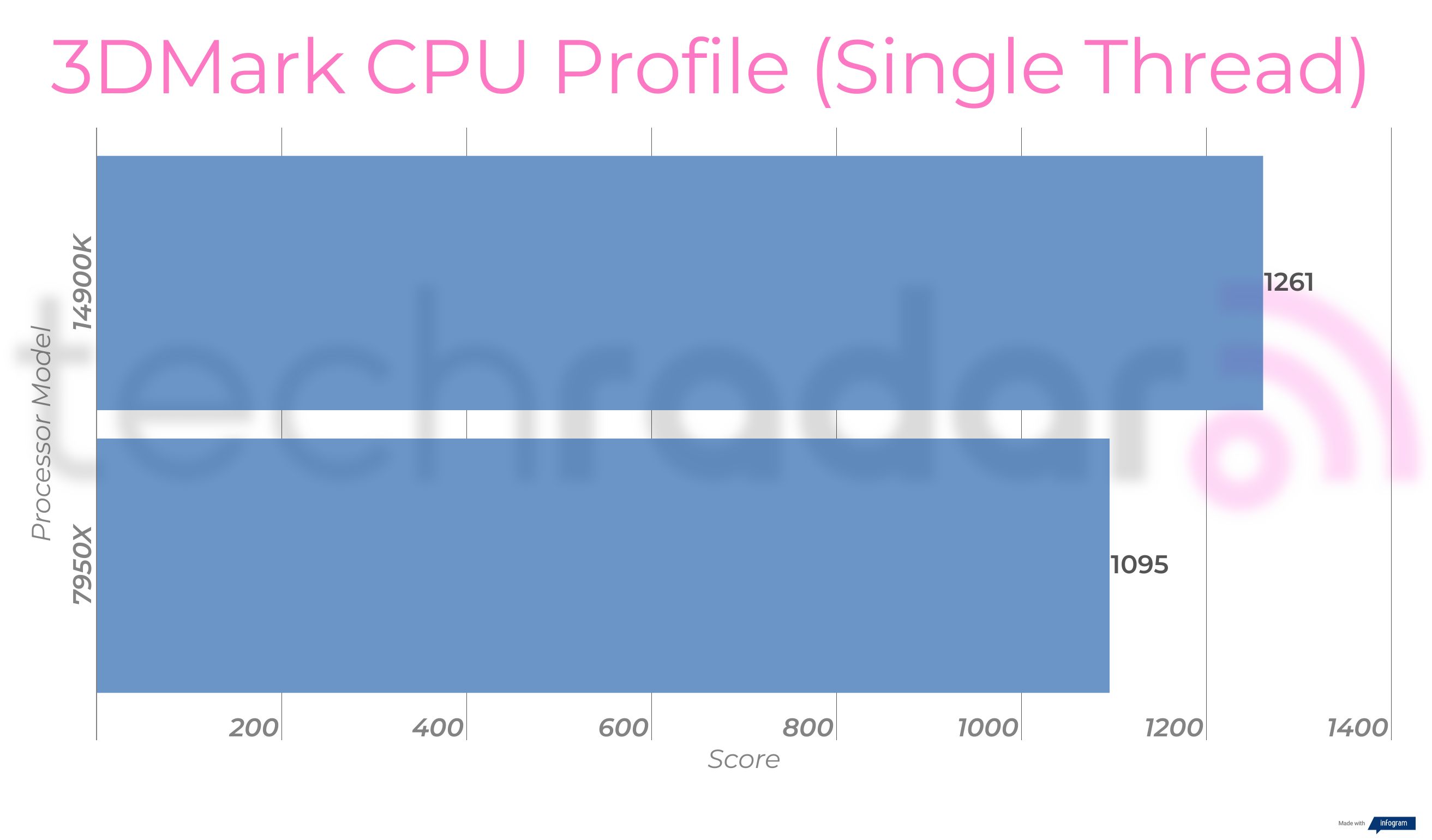
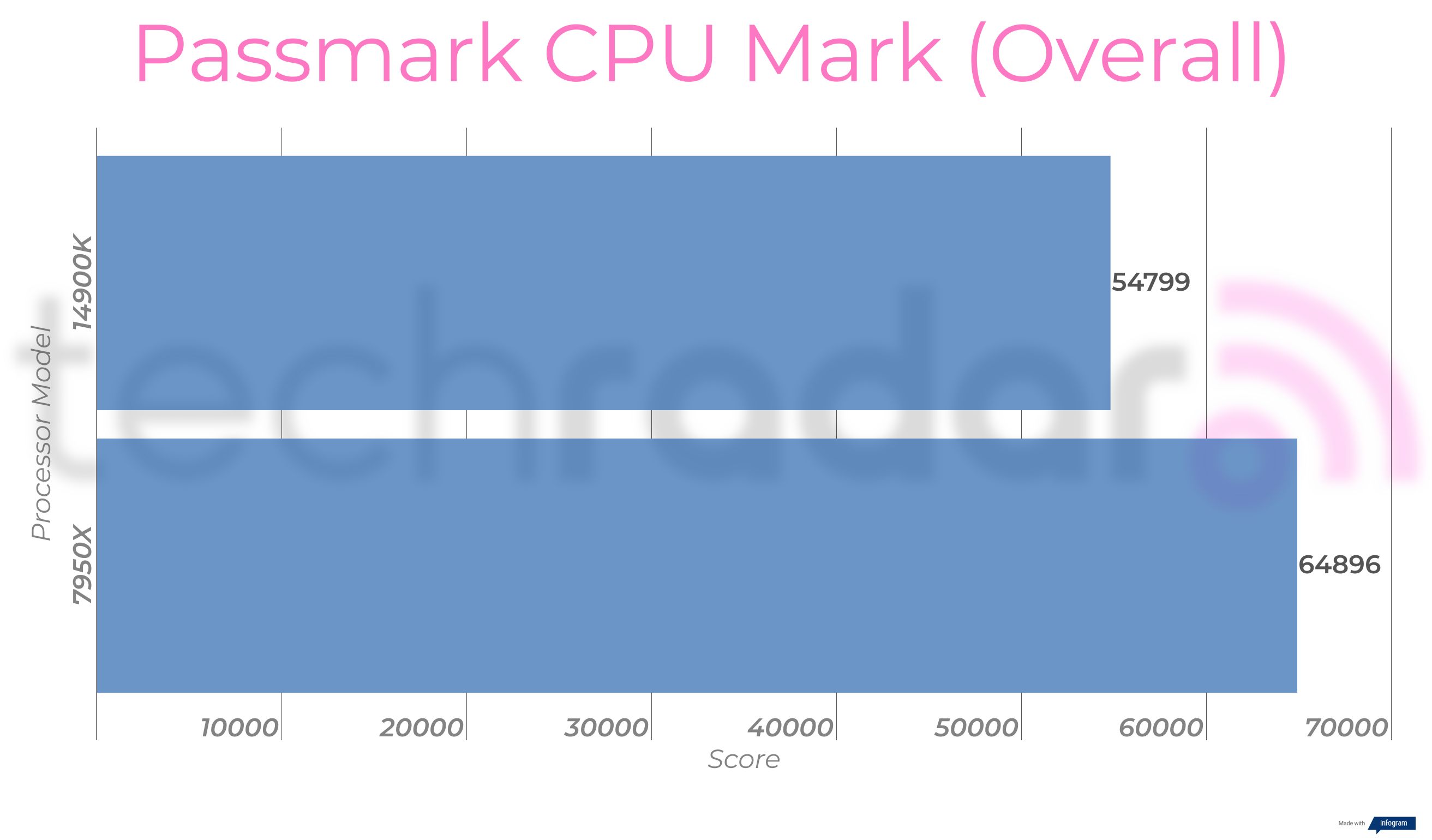
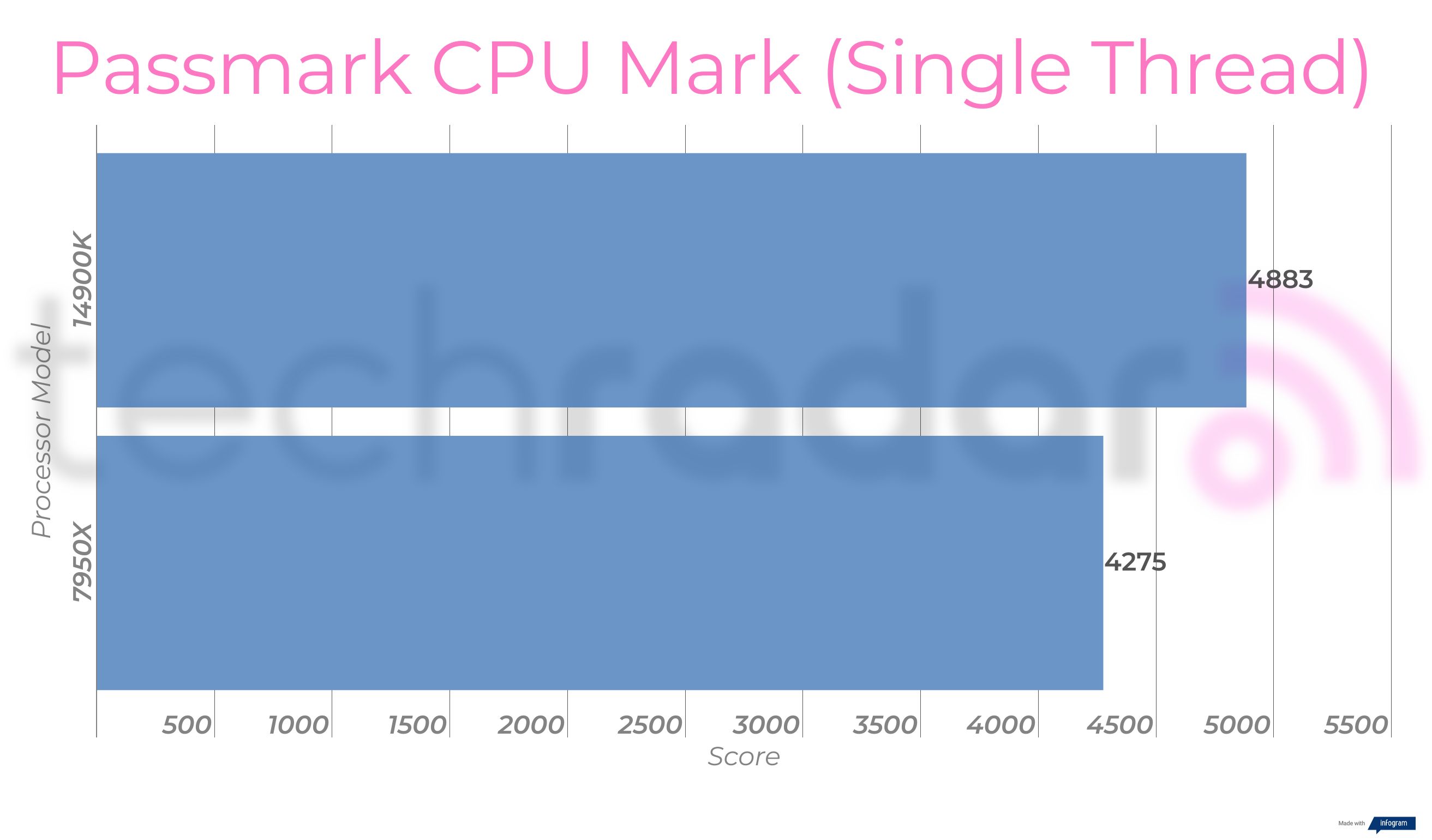
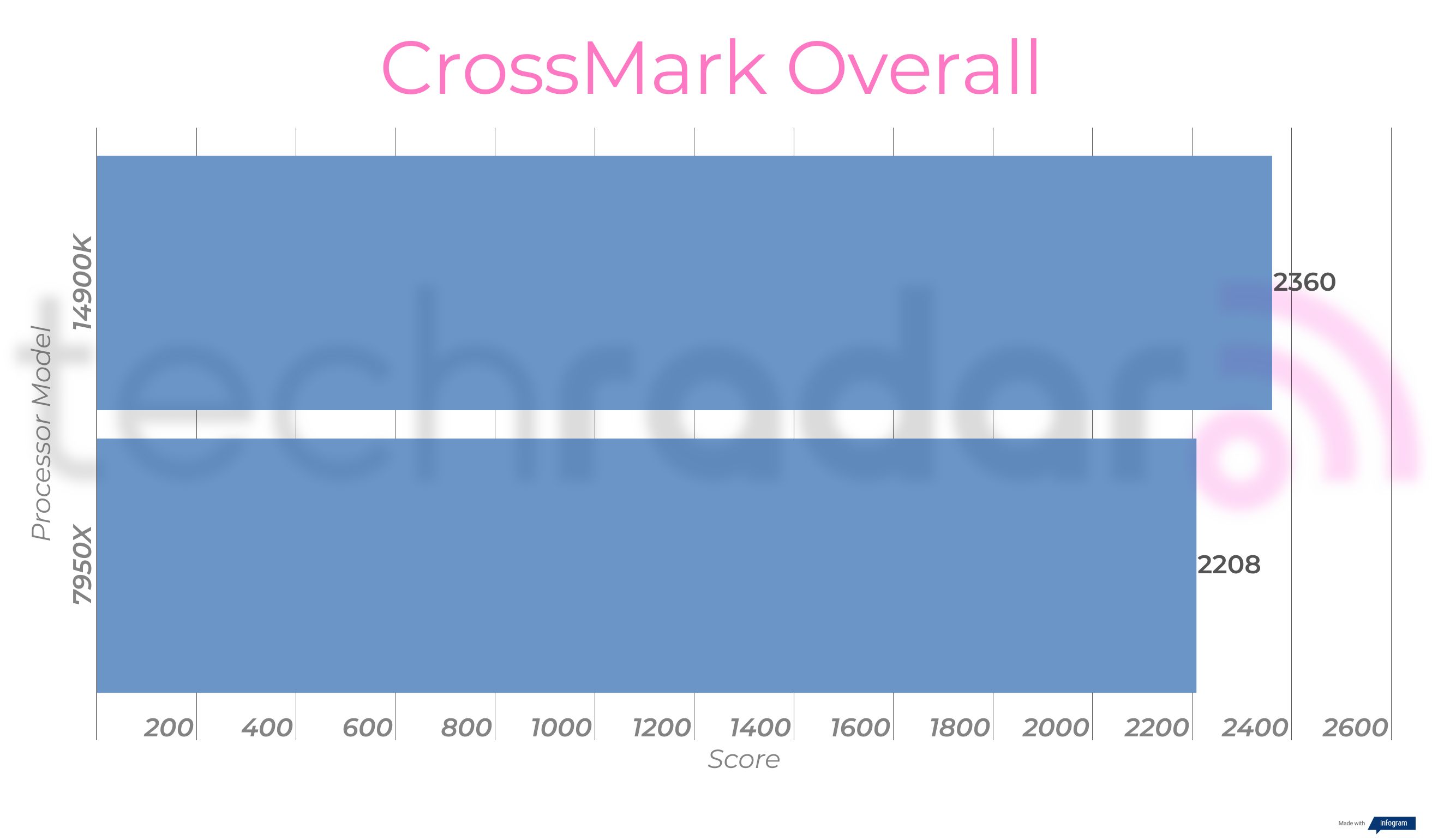
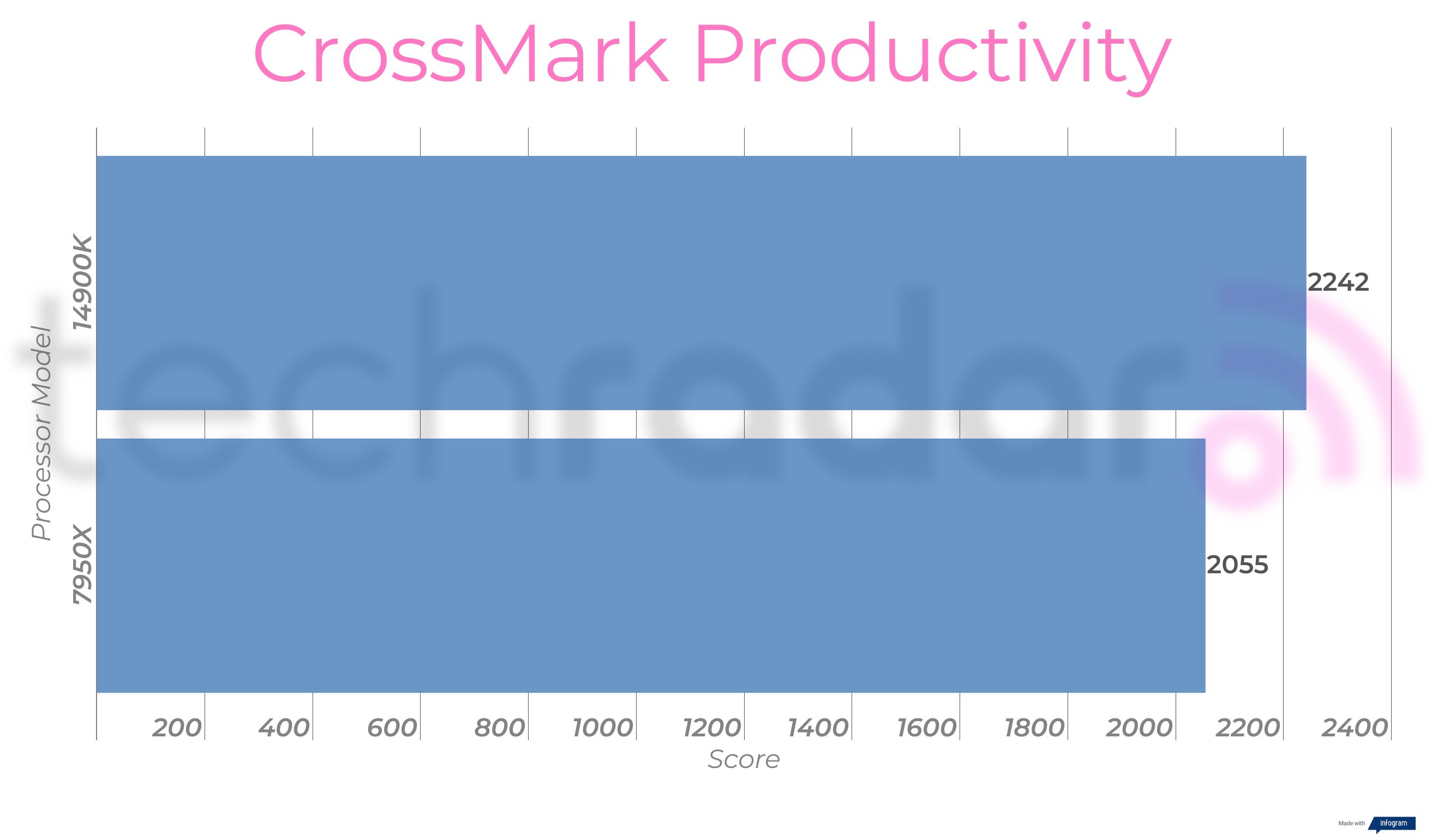
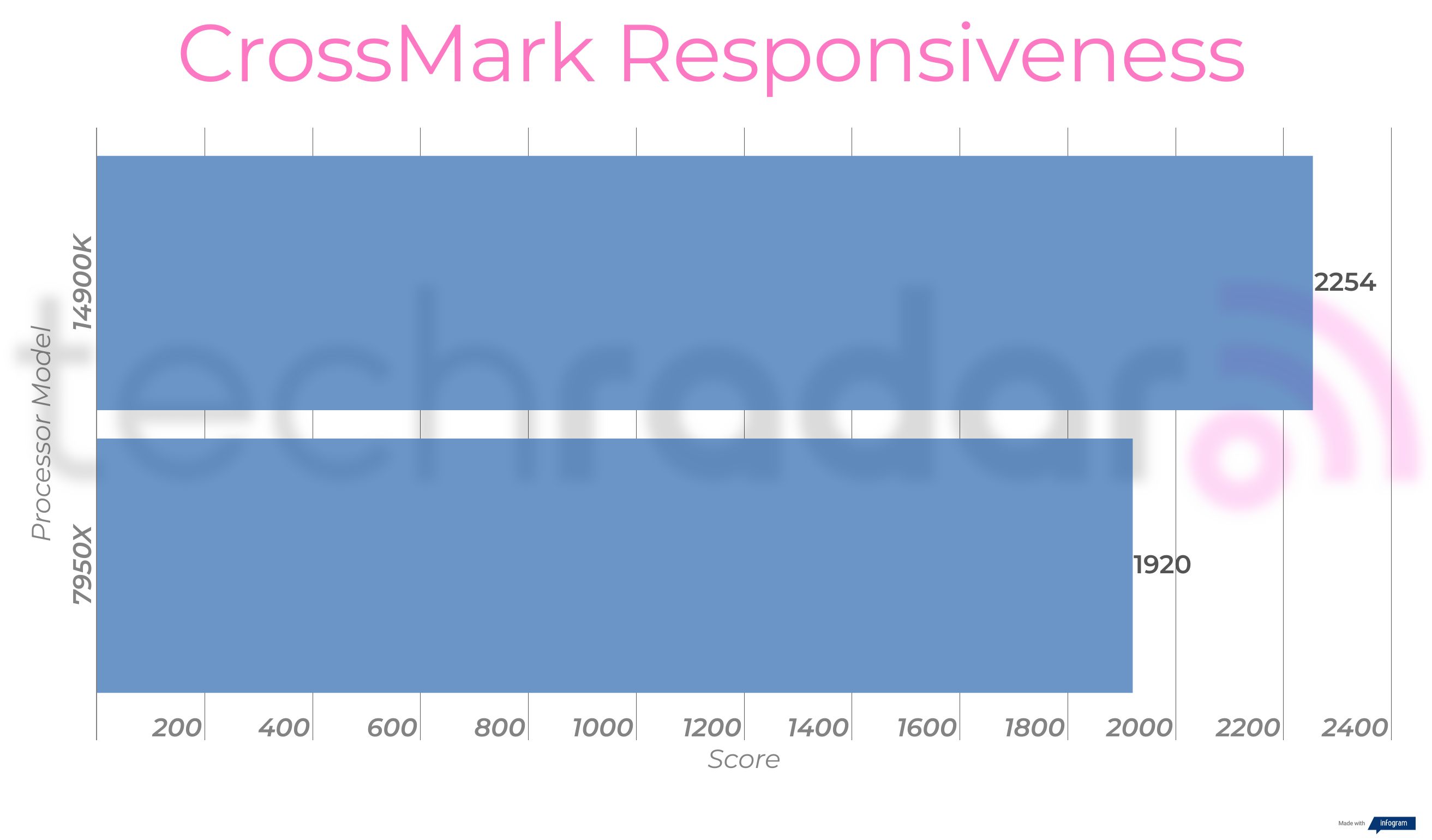
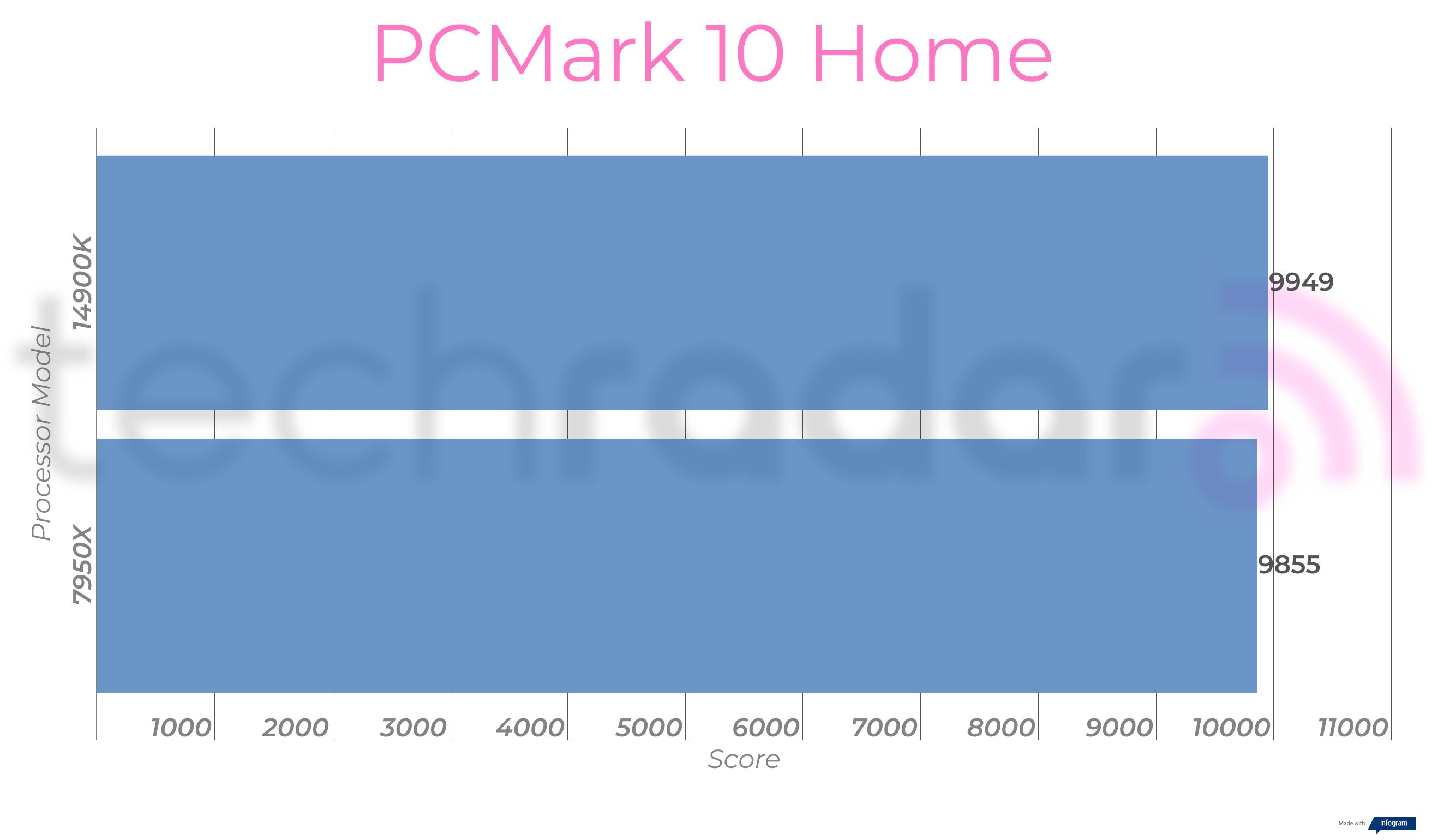
Generally speaking, Intel’s offering was stronger in single-core performance, but the added speed of the 7950X’s 16-cores meant that multi-core tasks were stronger in some cases. It is pretty close to call, but there’s around a 13% difference in favor of Intel in many instances.
Things become far clearer with the productivity performance of the 14900K vs 7950X as the far greater core count of the 14th Gen i9 CPU means that Intel’s latest model comes out on top. The 7950X doesn’t do bad at all, but can’t quite compete with Team Blue having an 8% advantage.
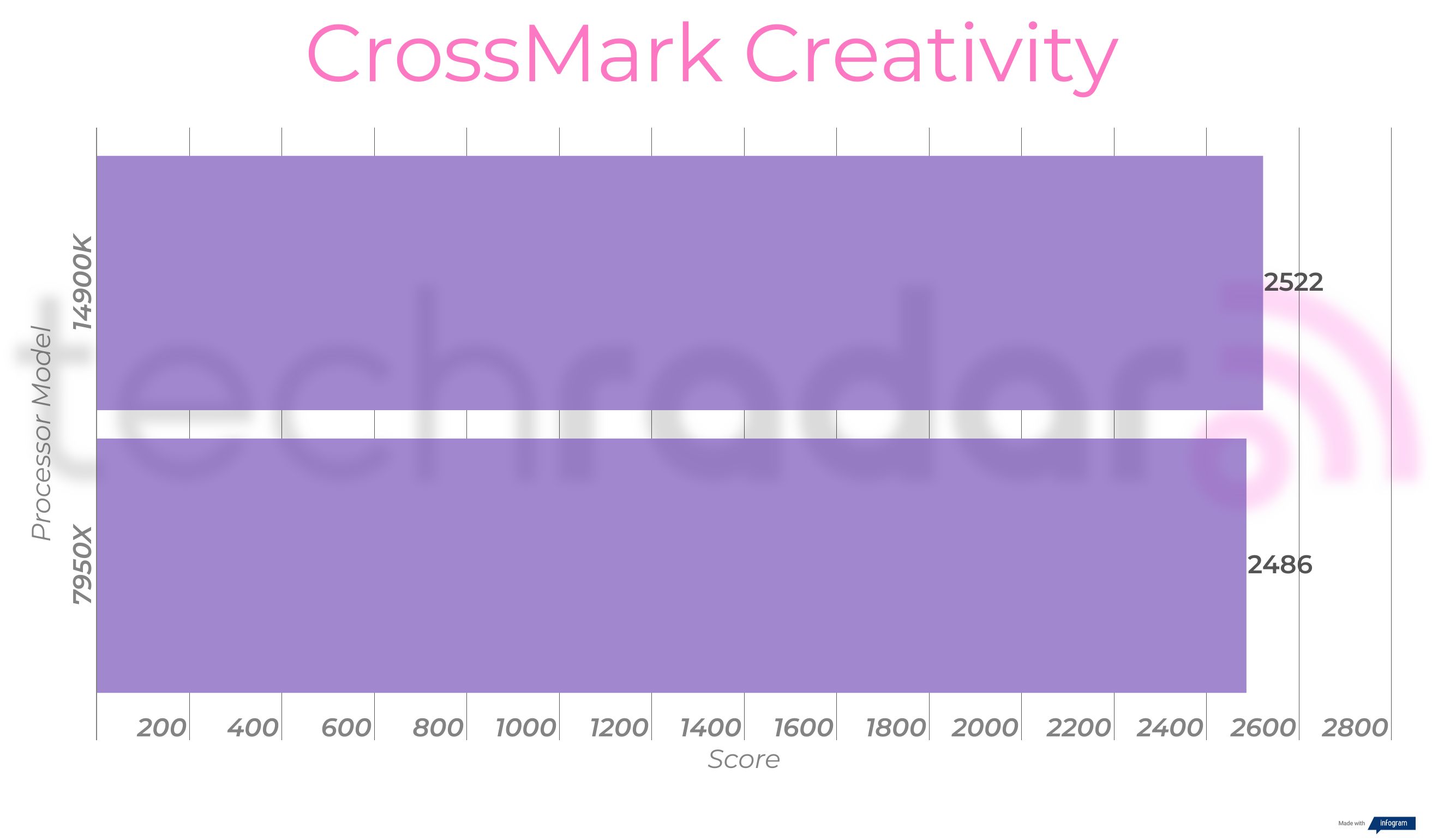
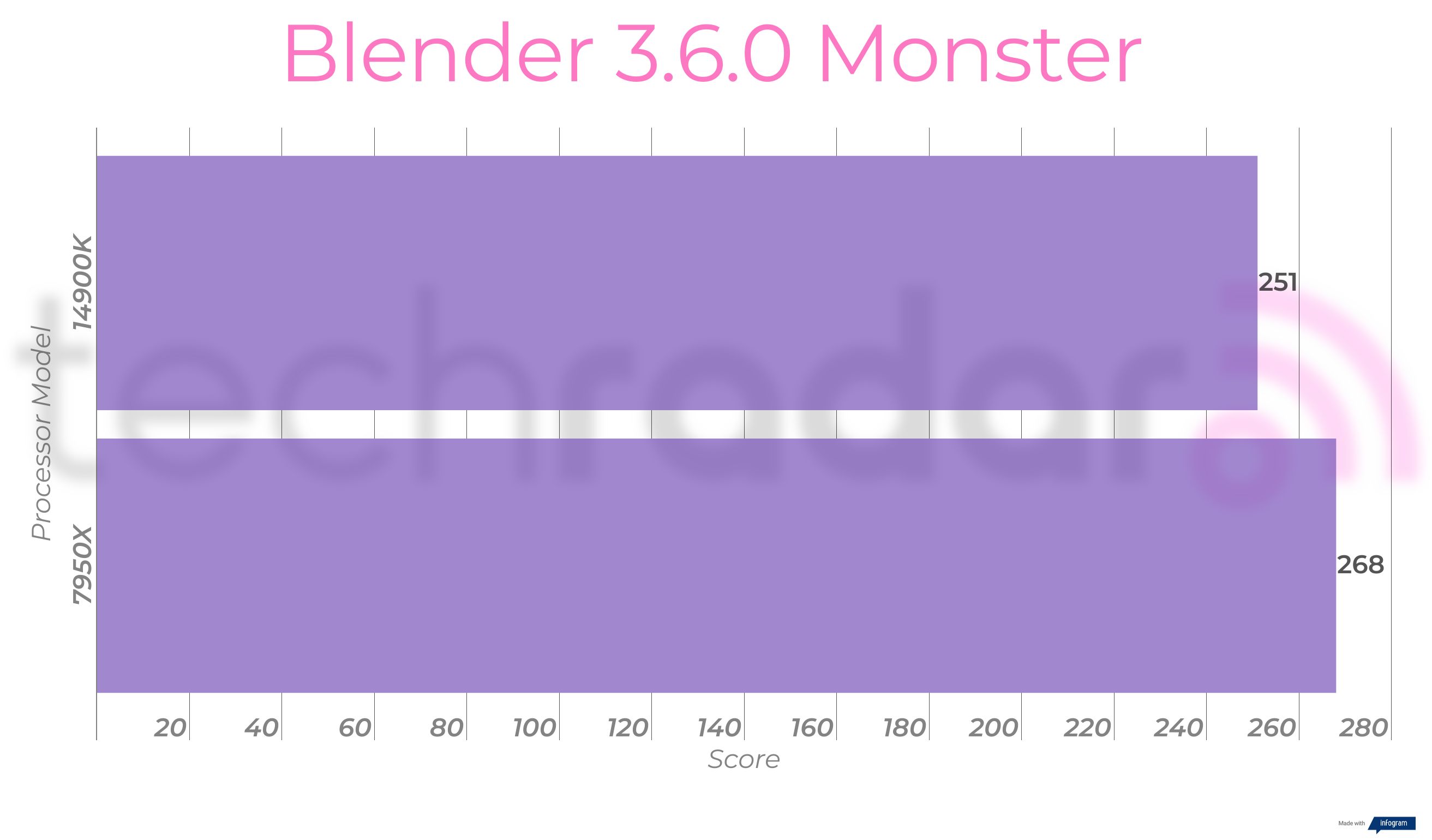
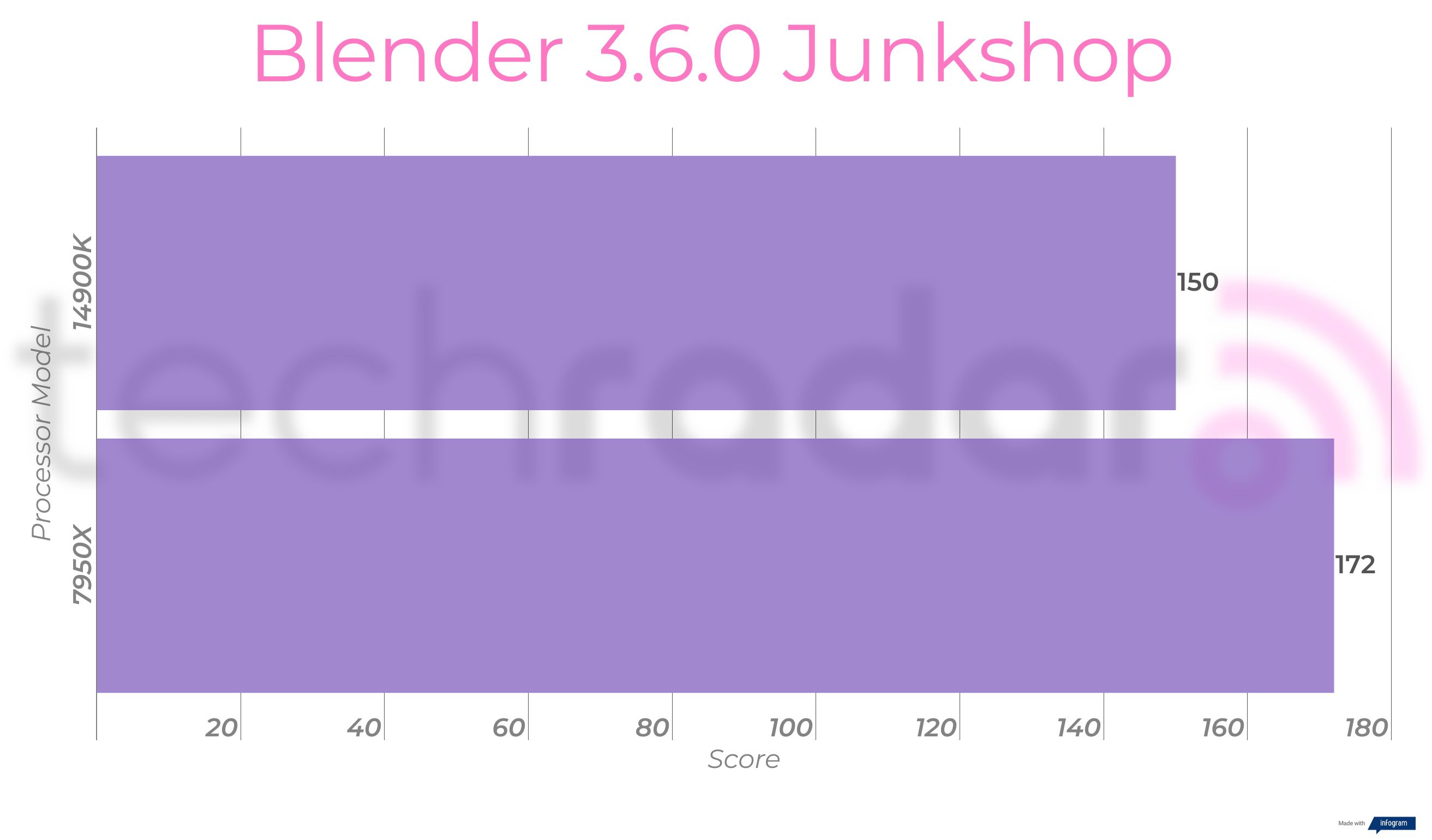
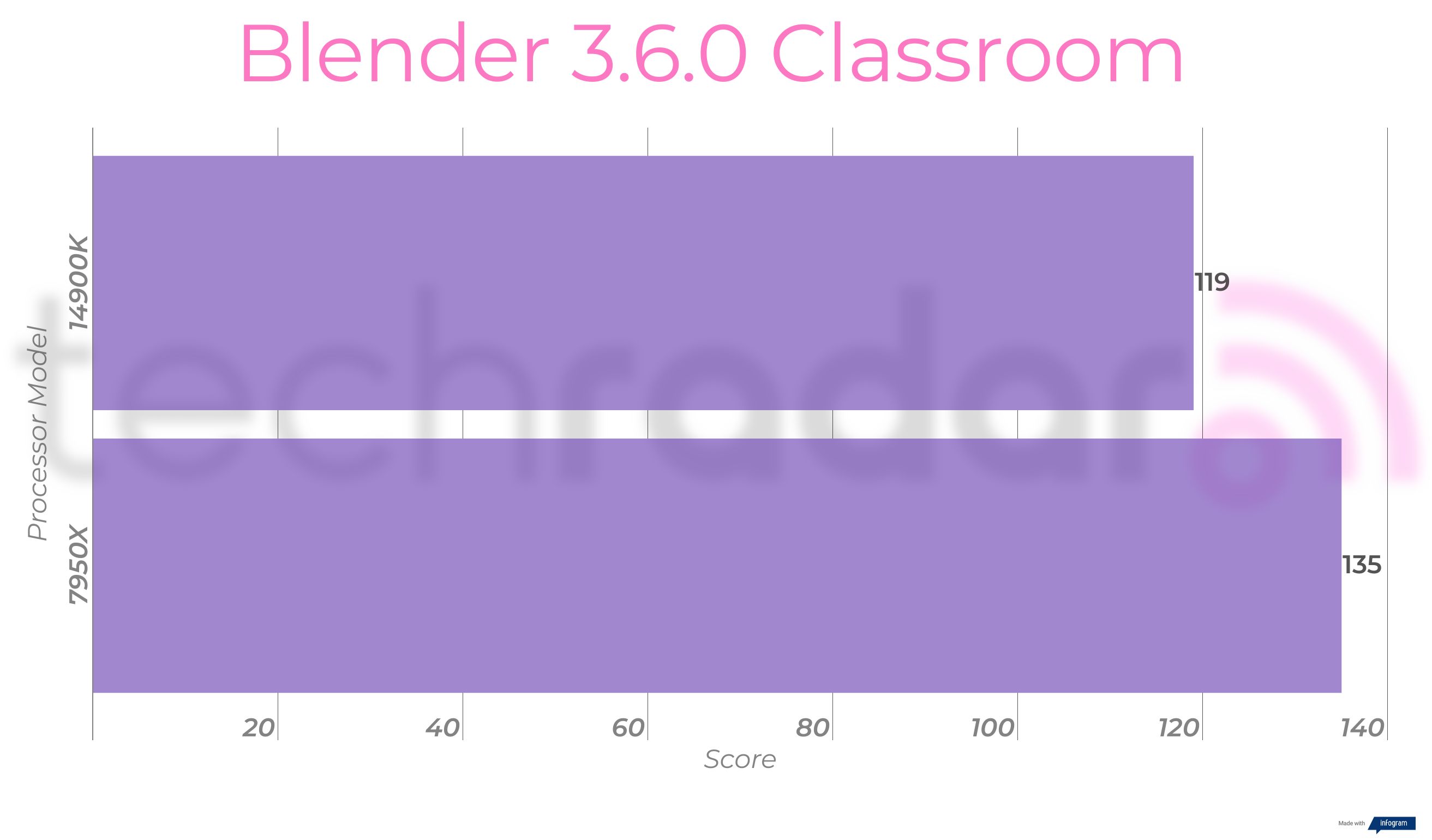
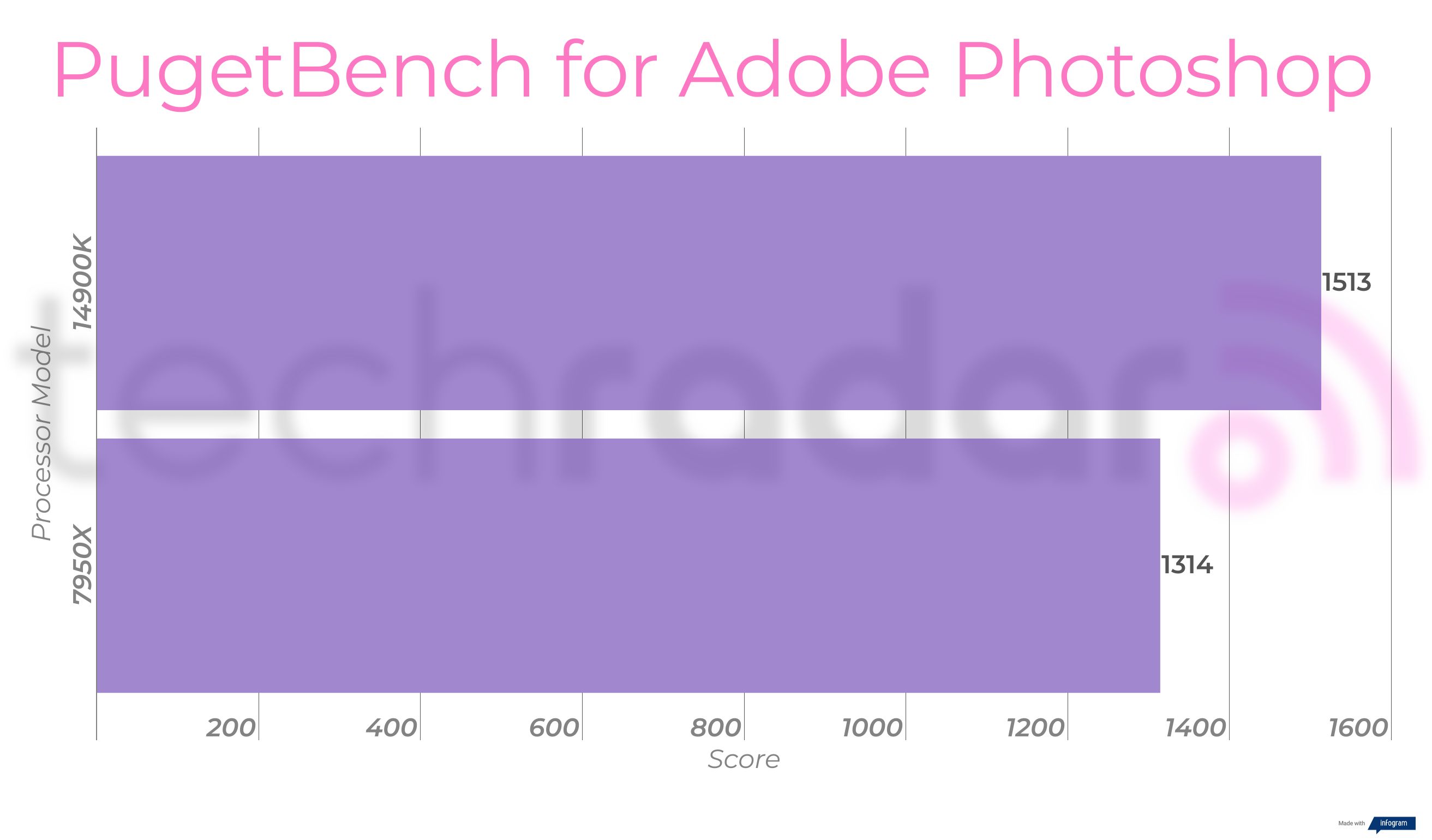
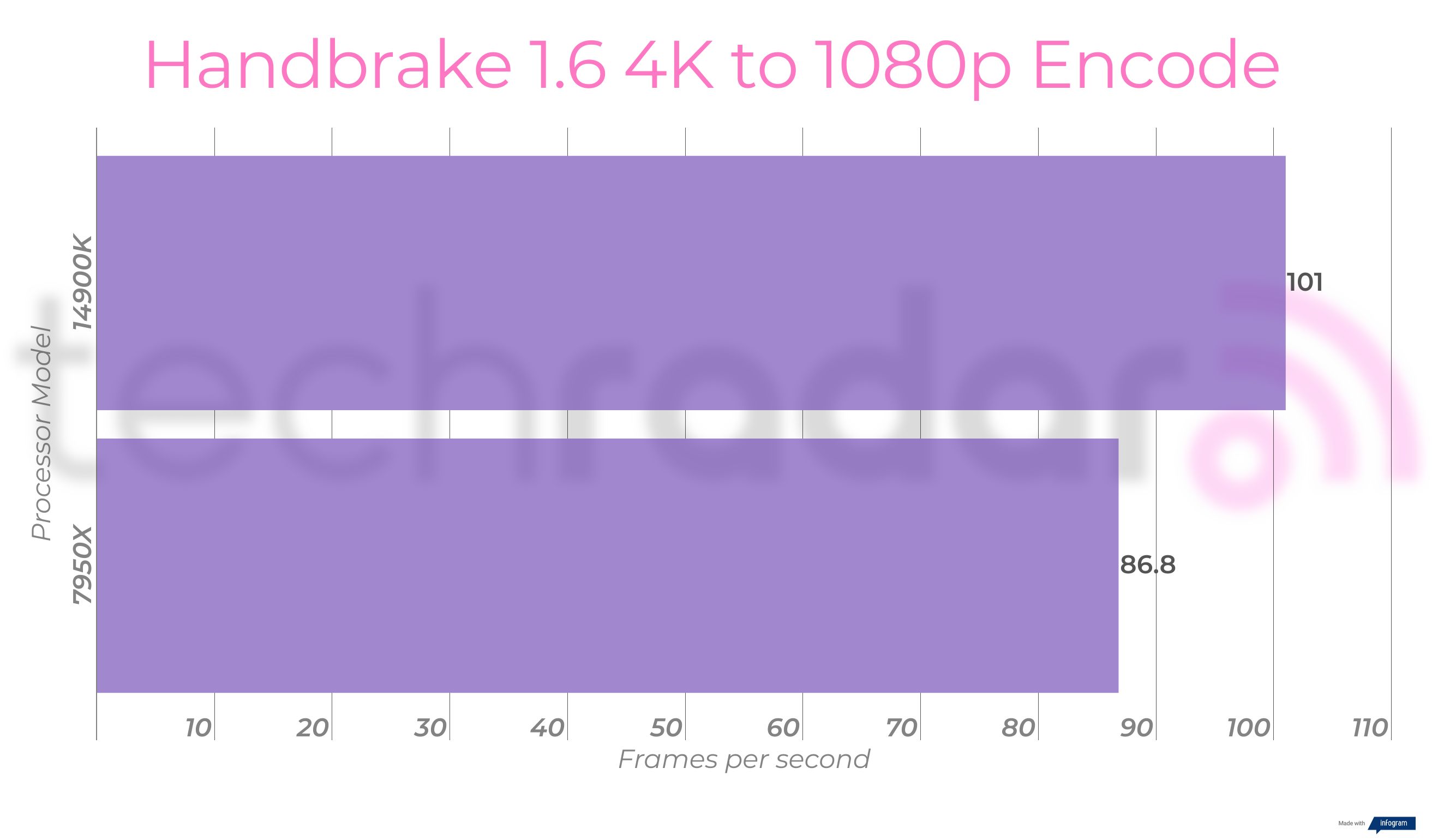
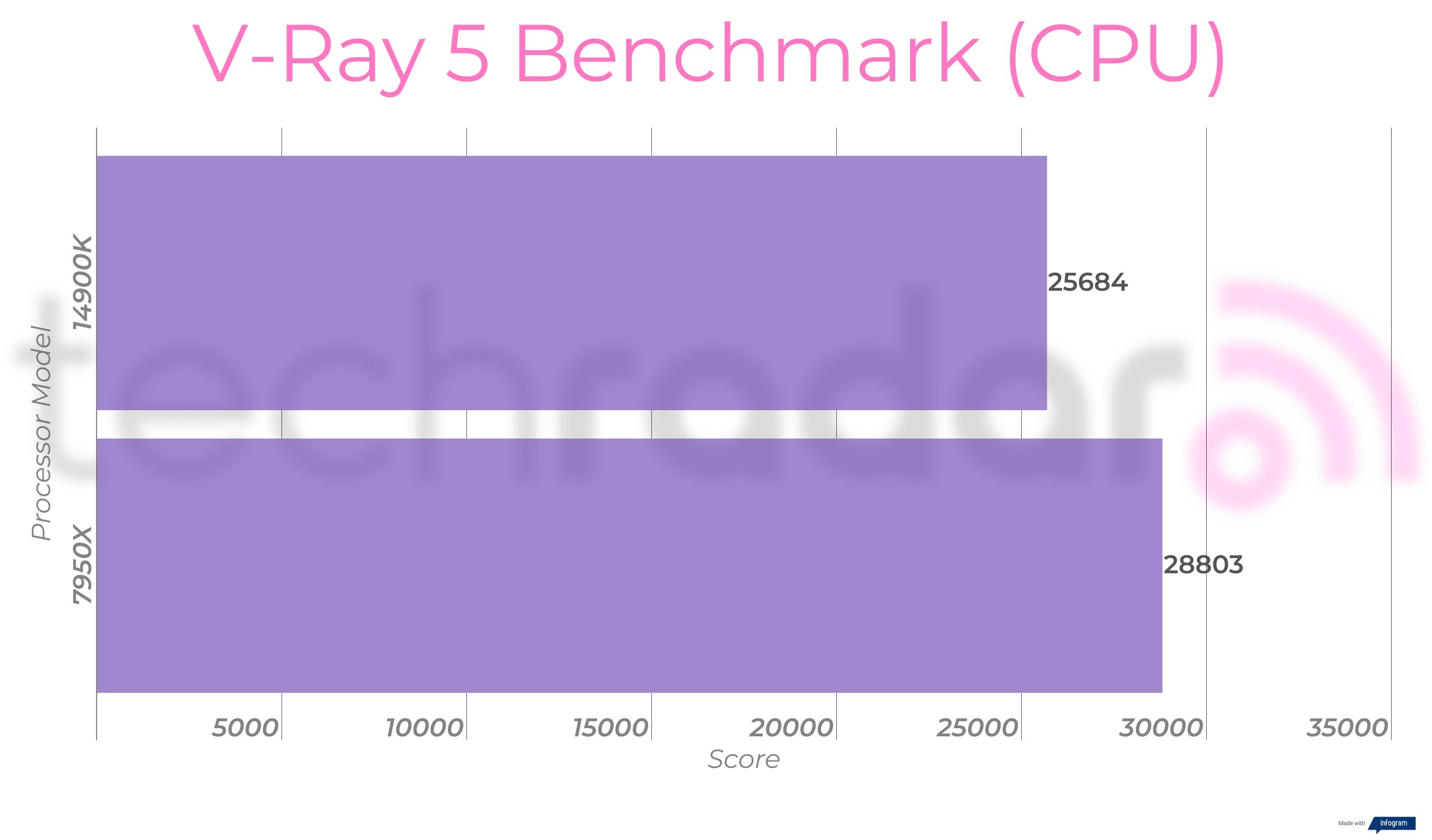
It’s a similar story with creativity benchmarks between the Intel Core i9-14900K and the AMD Ryzen 9 7900X, with a pretty even split between both processors. The former takes the lead in CrossMark, PugetBench, and Handbrake, but the latter excels in Blender and V-Ray 5.
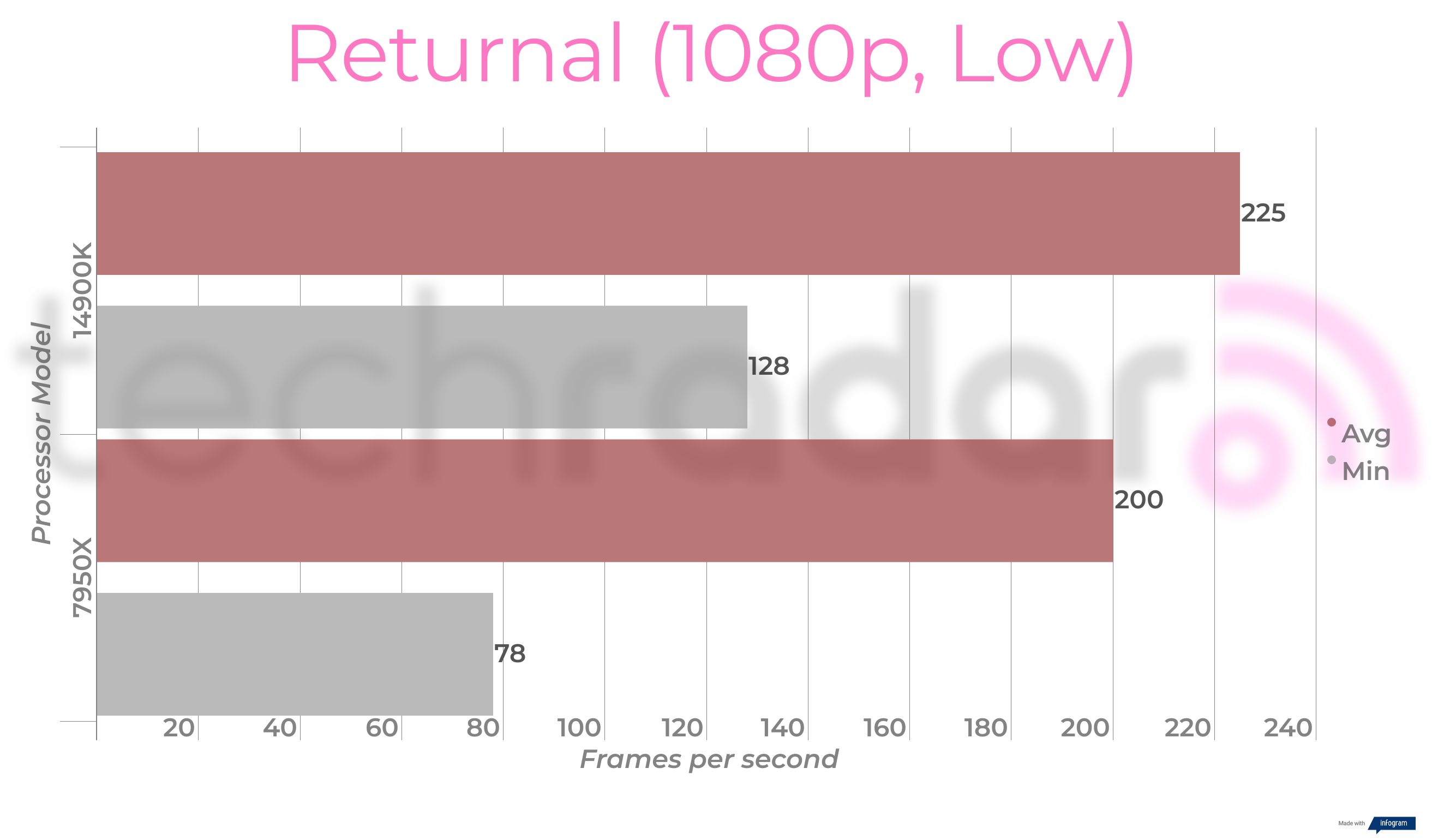
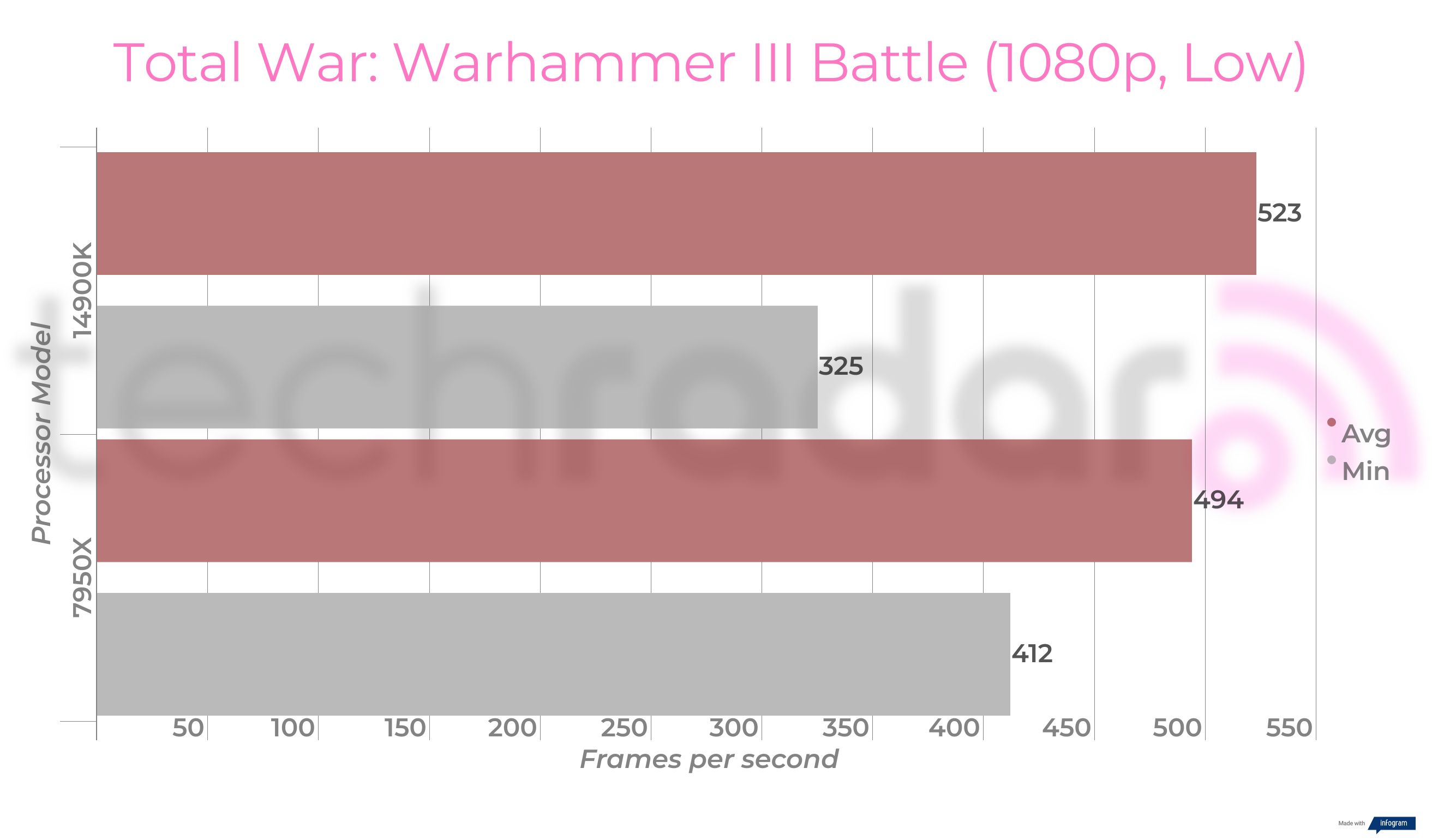
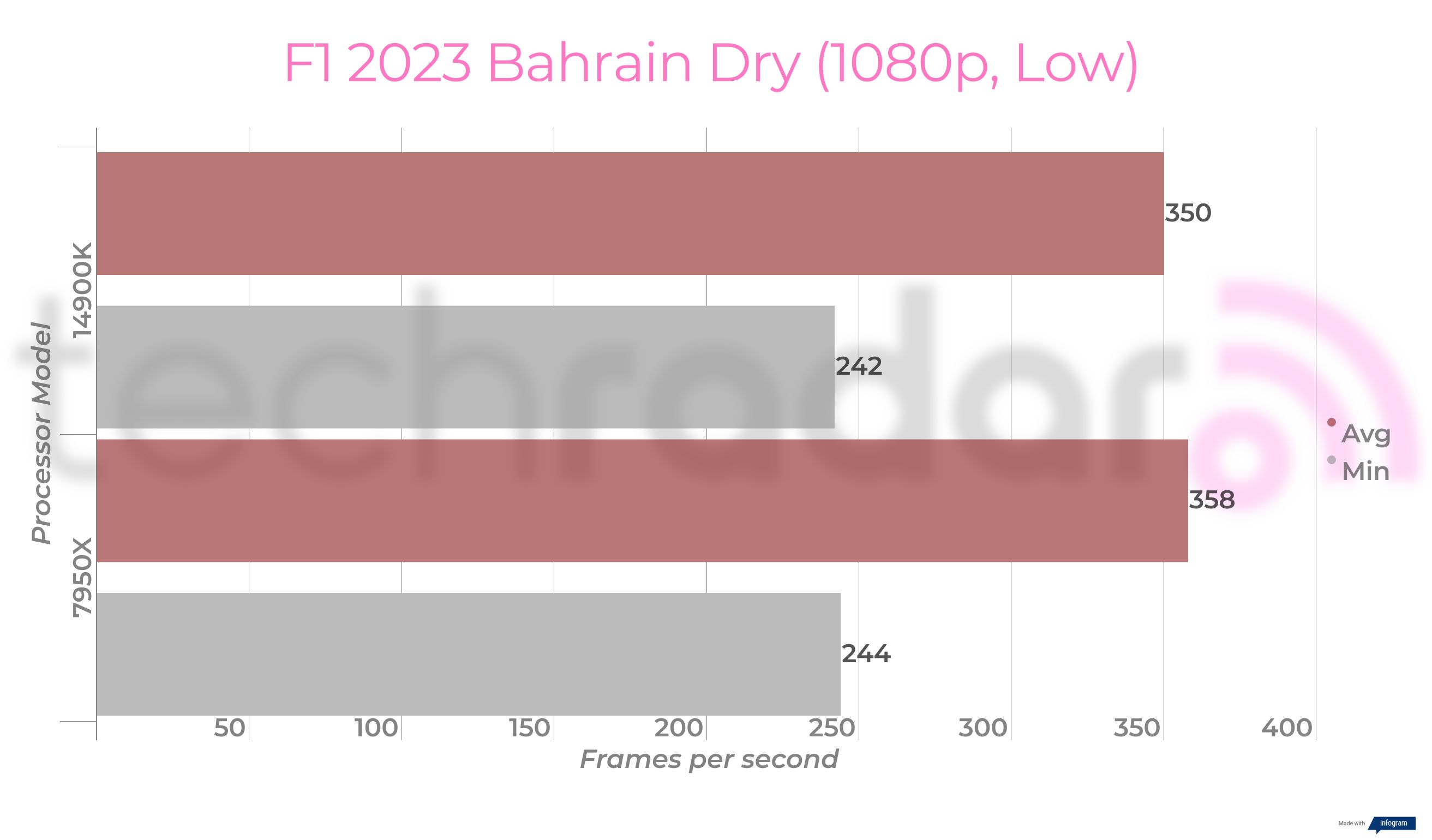
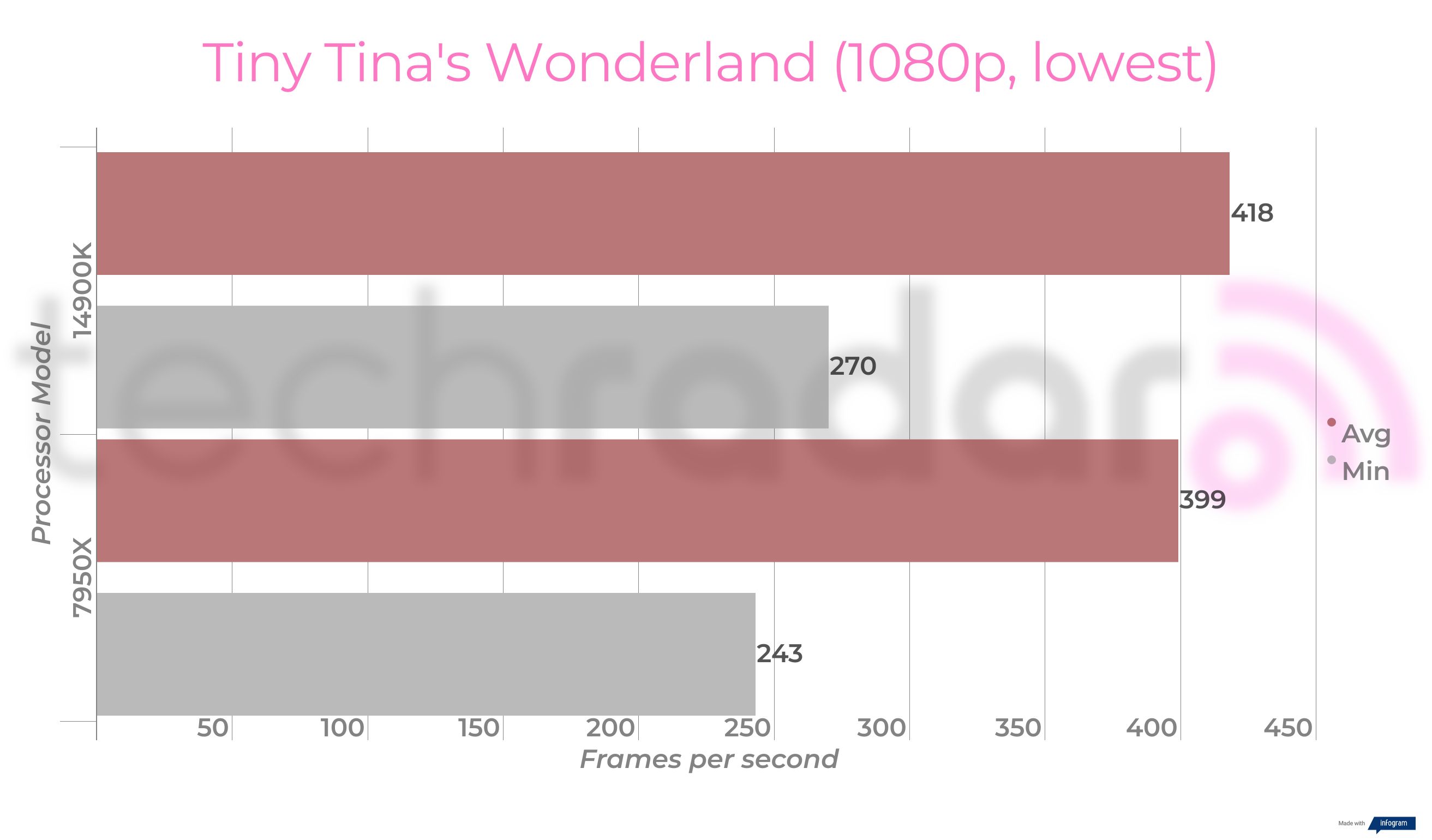
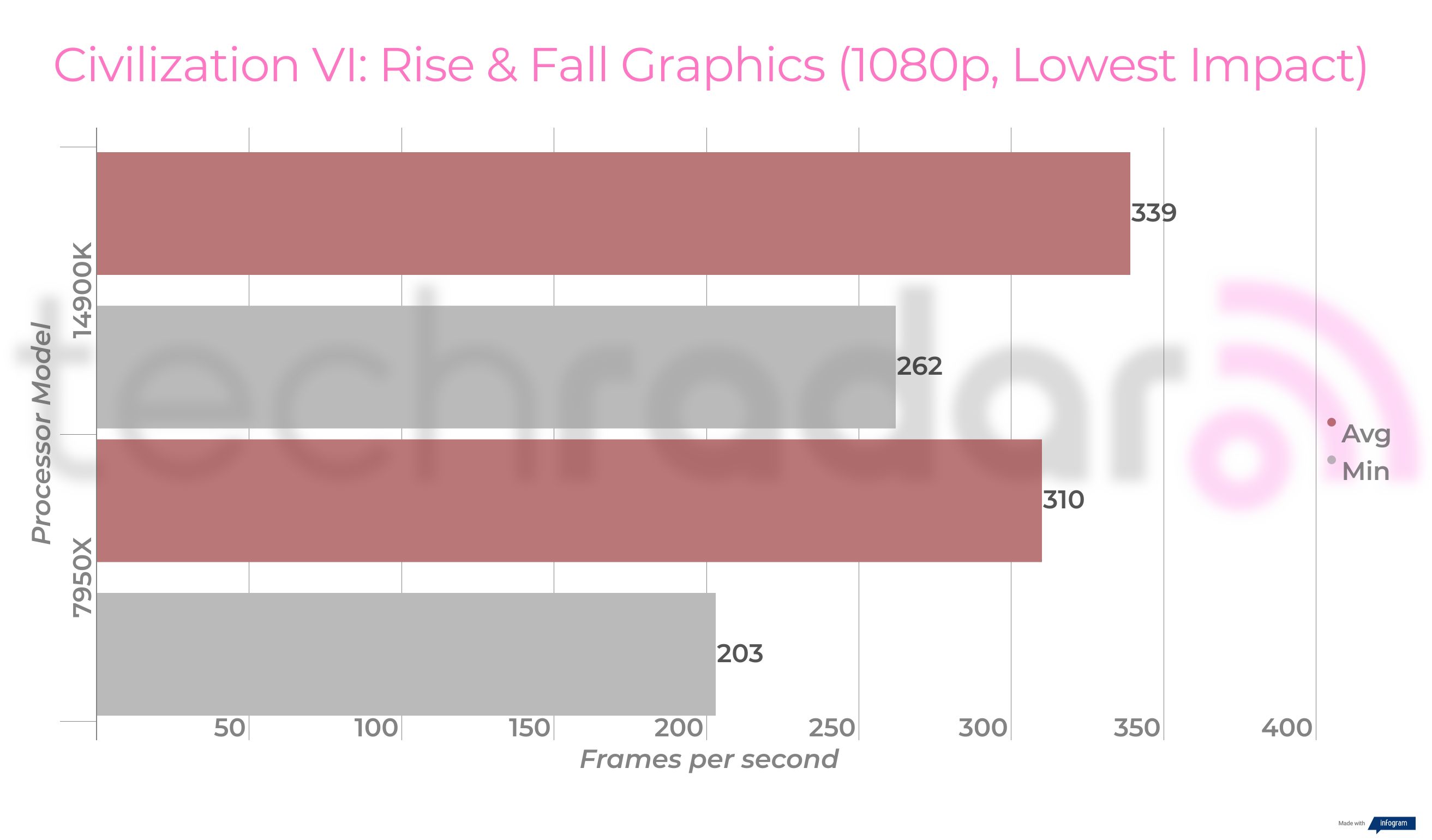
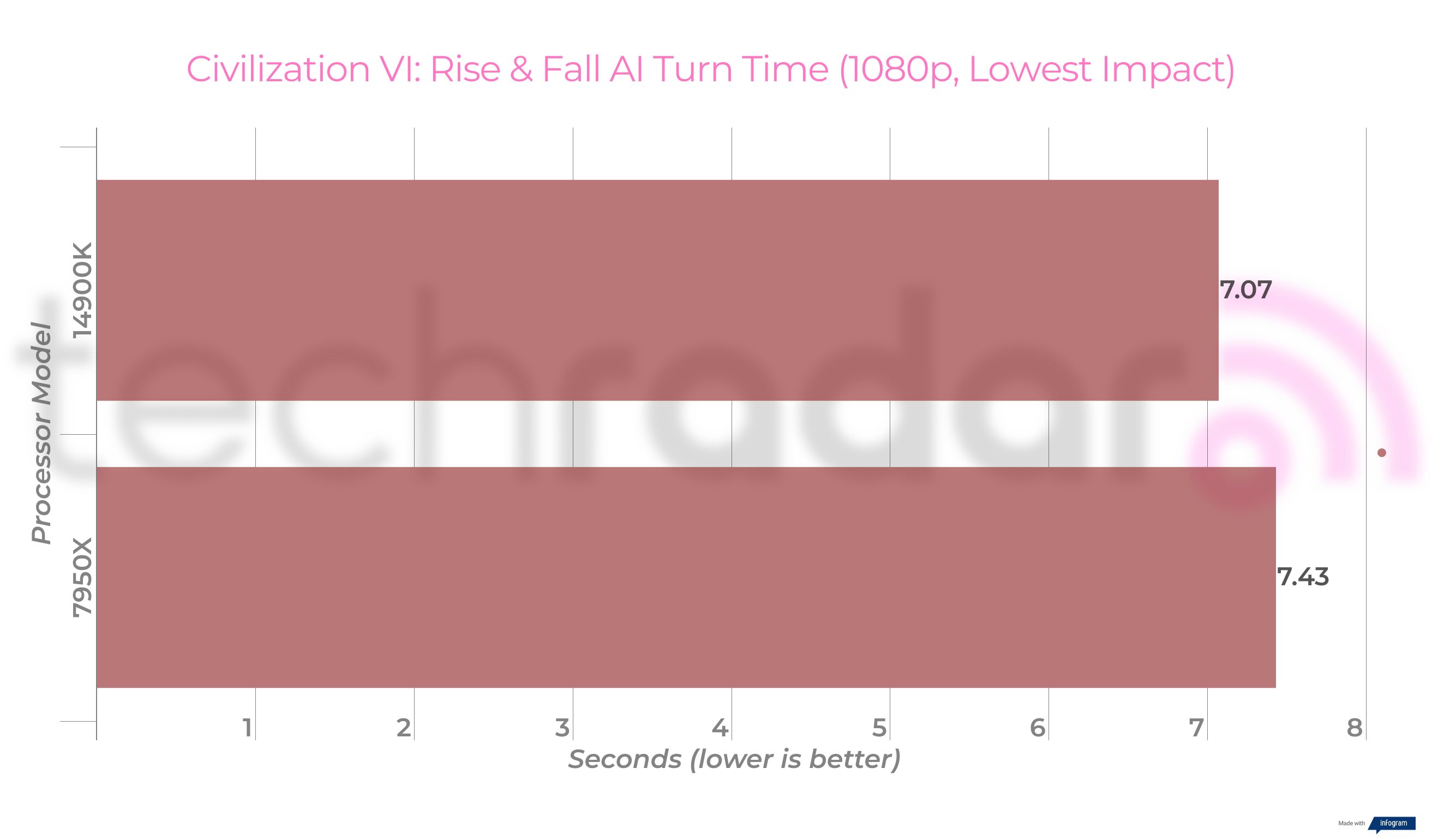
While there are a few exceptions to the rule, generally, the Intel Core i9-14900K comes out on top in terms of CPU-bound gaming performance, with the biggest lead being in Returnal and Civilization. That’s not to count out the 7950X, however, as it was a little faster in Total War: Warhammer 3 and F1 2023, but things lean more towards Intel this time.
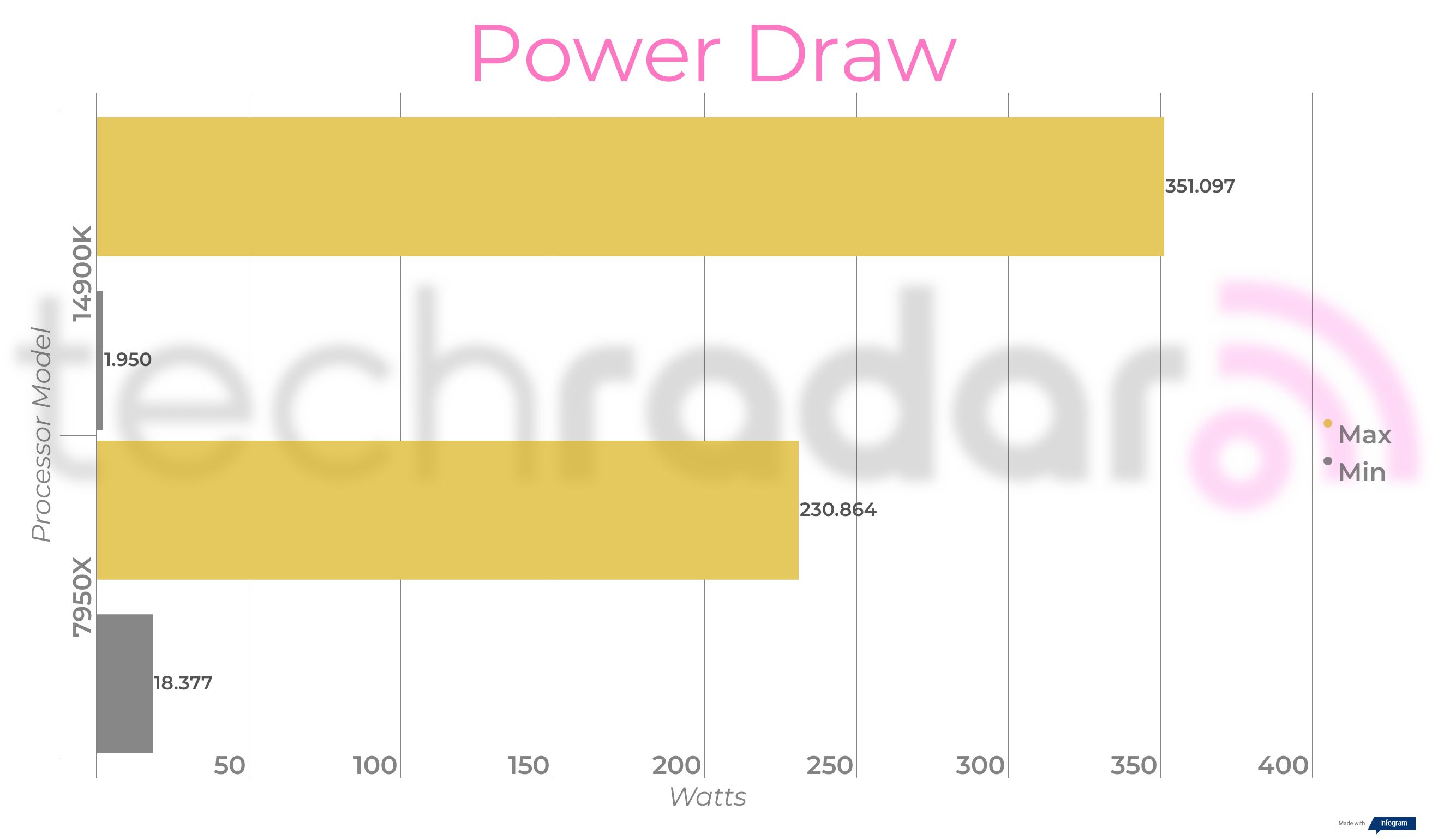
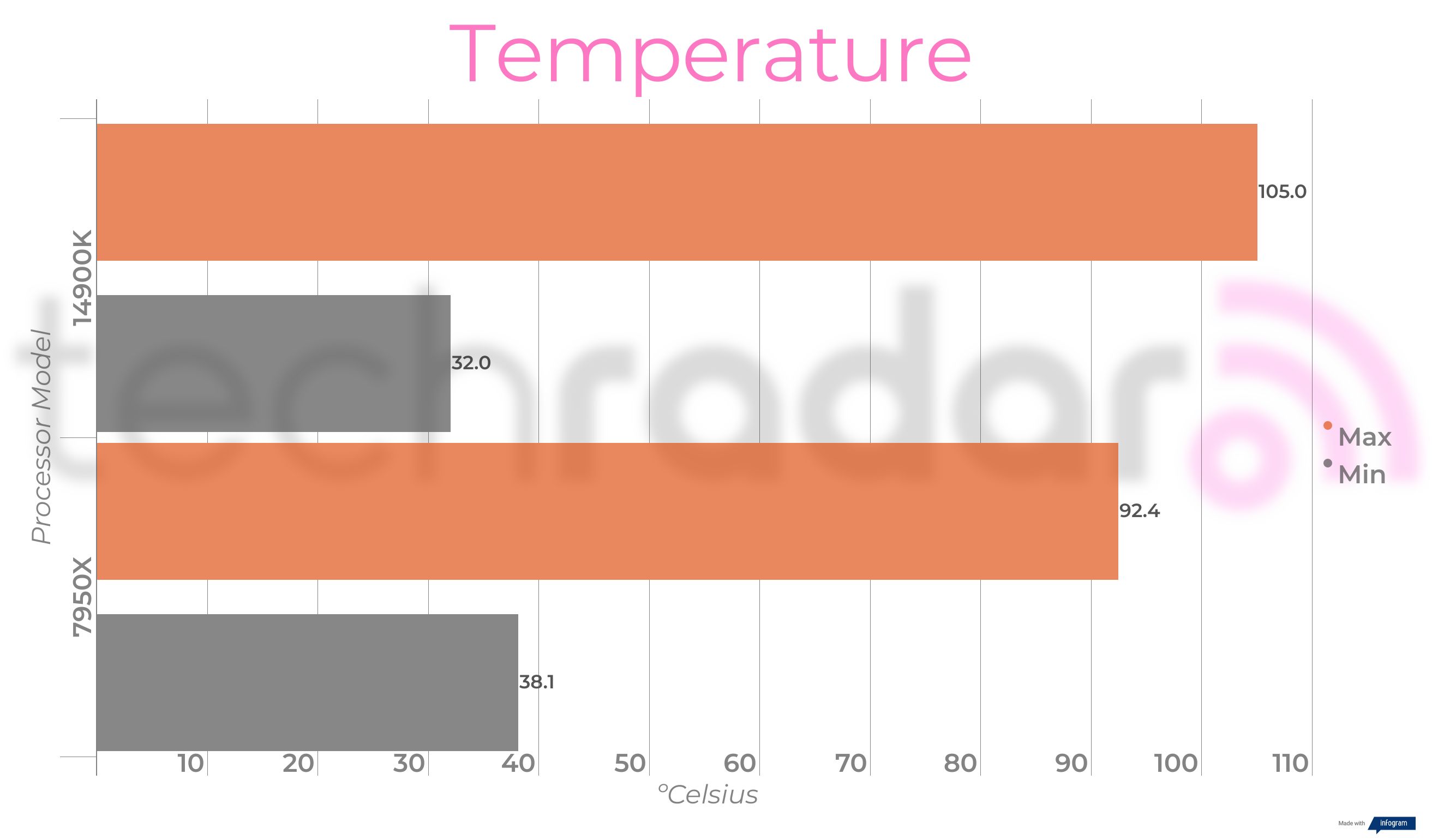
In terms of the thermals and power draw, the AMD Ryzen 9 7950X ran a little hotter as a base line but didn't quite as warm as the Intel Core i9-14900K under heavy stress. The hottest the former got was 92.4℃ but the latter topped out at a pretty extreme 105℃. More importantly, AMD’s latest ran significantly more efficiently by 52%.
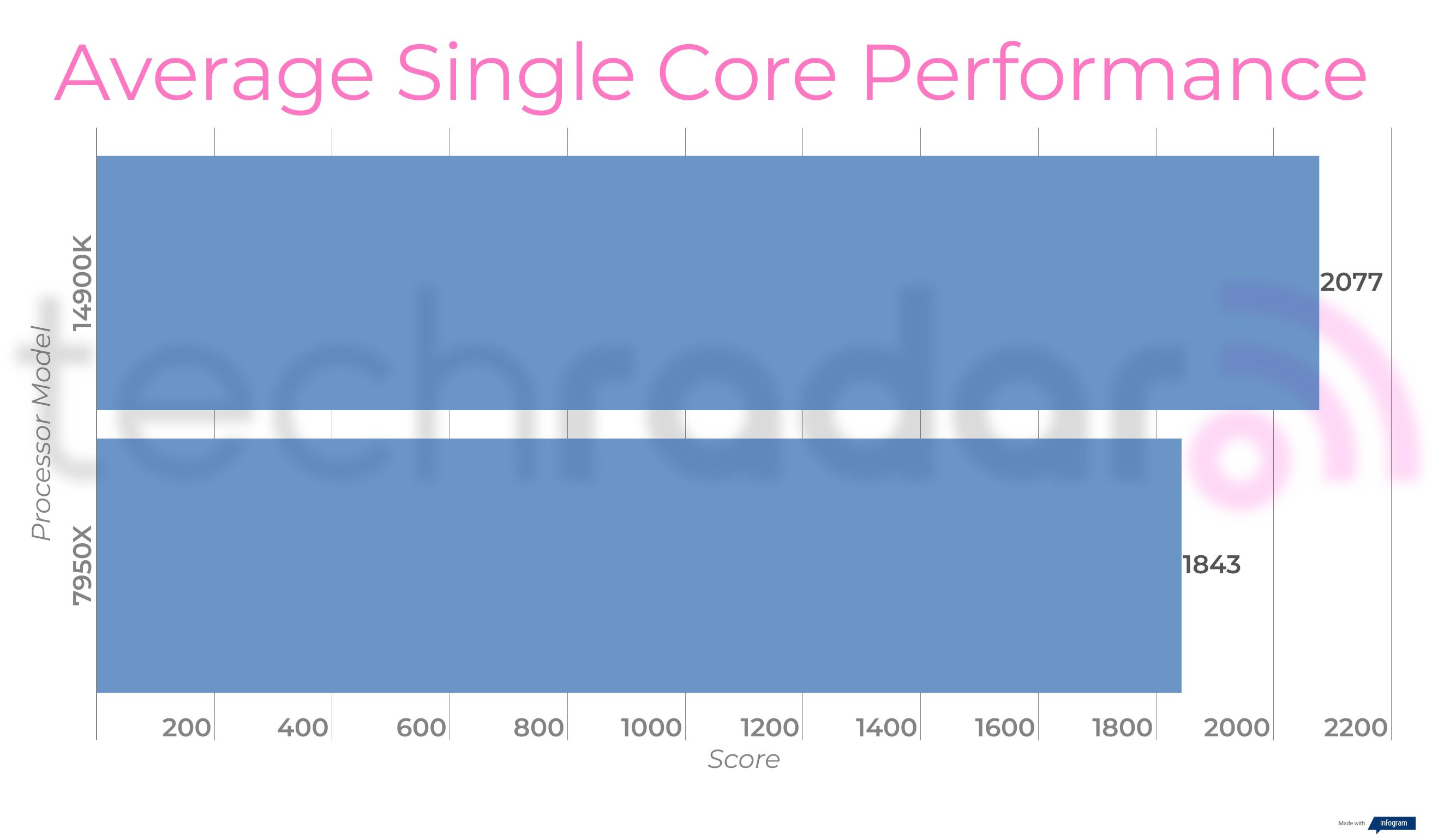
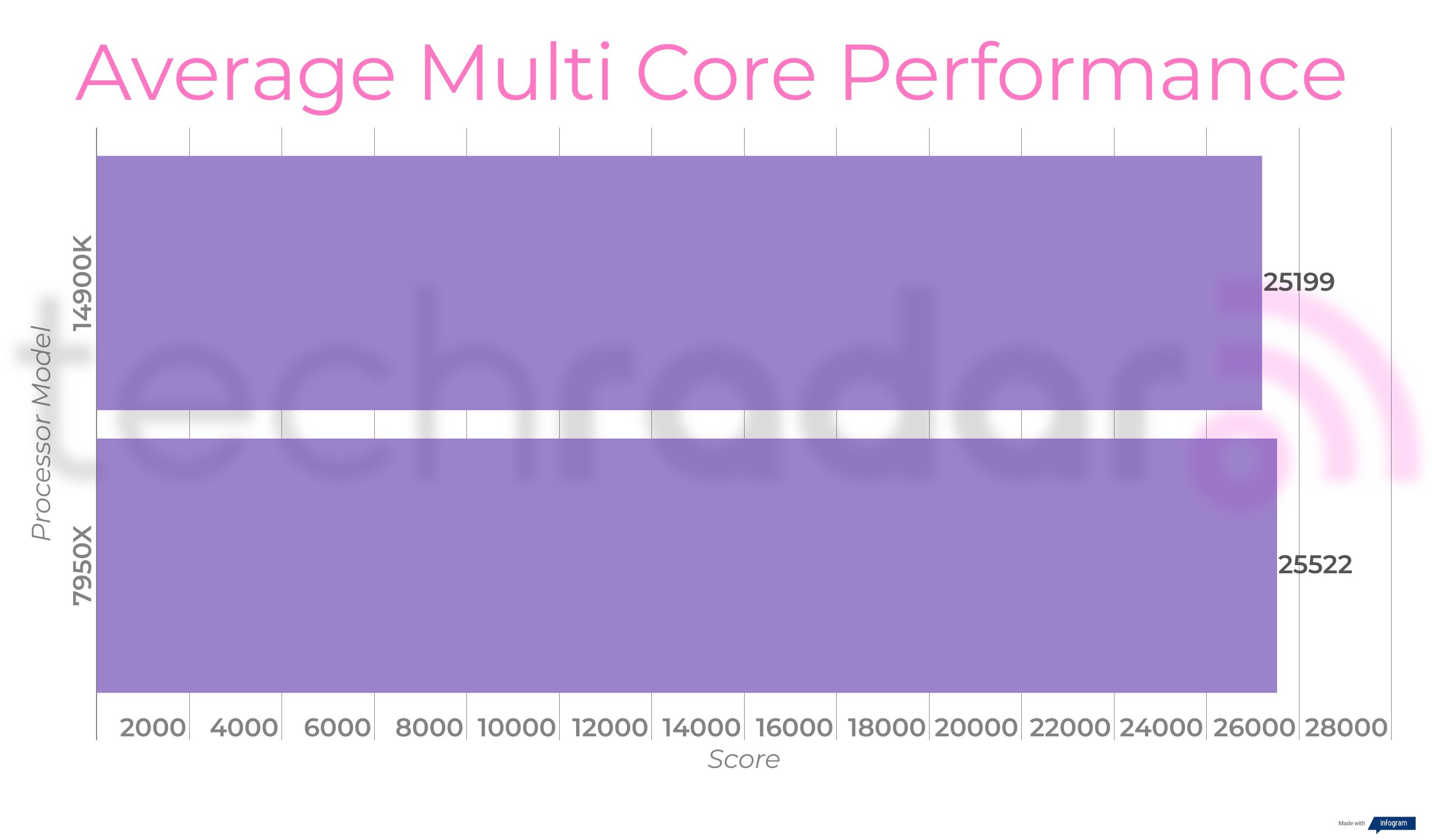
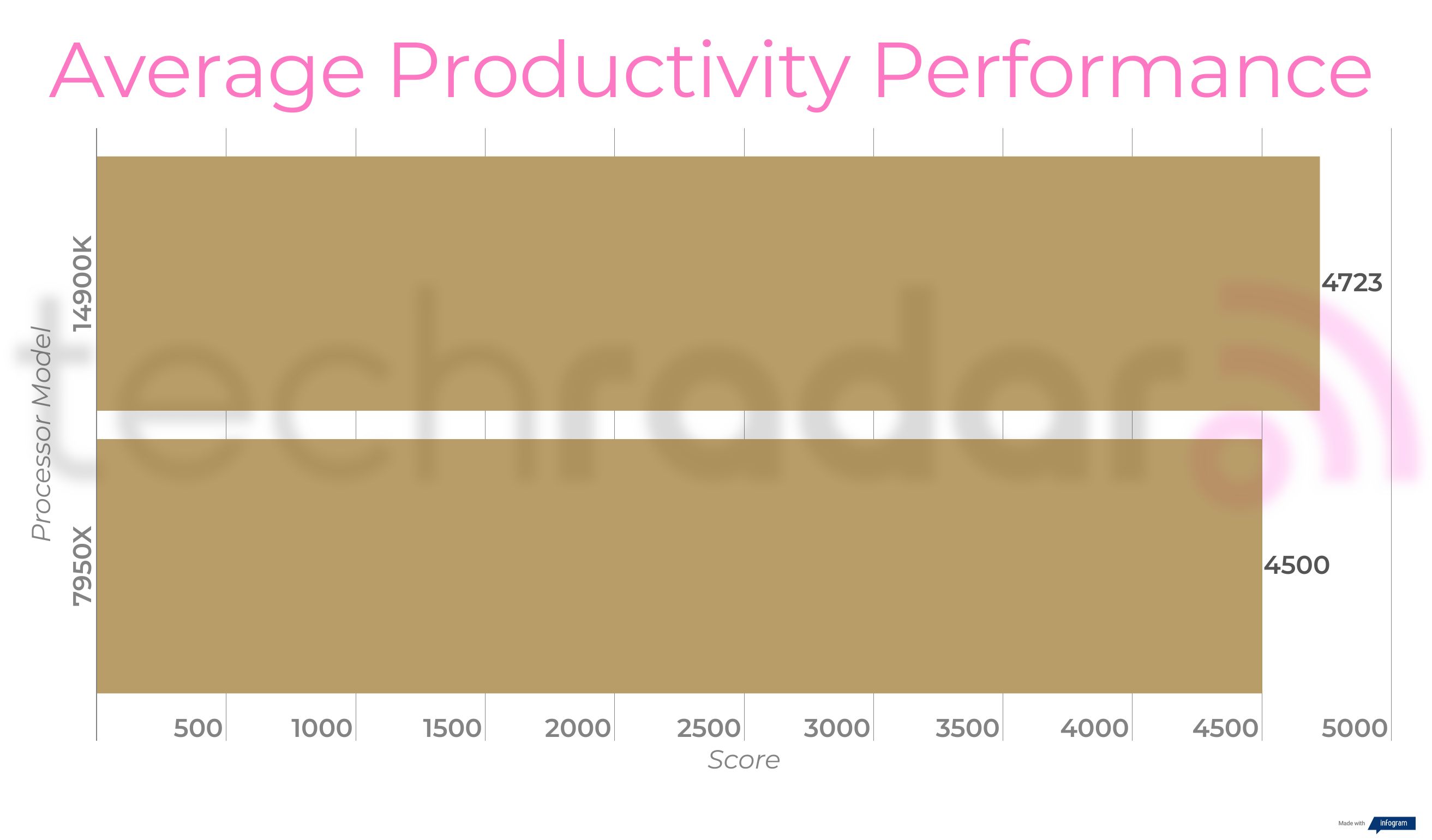
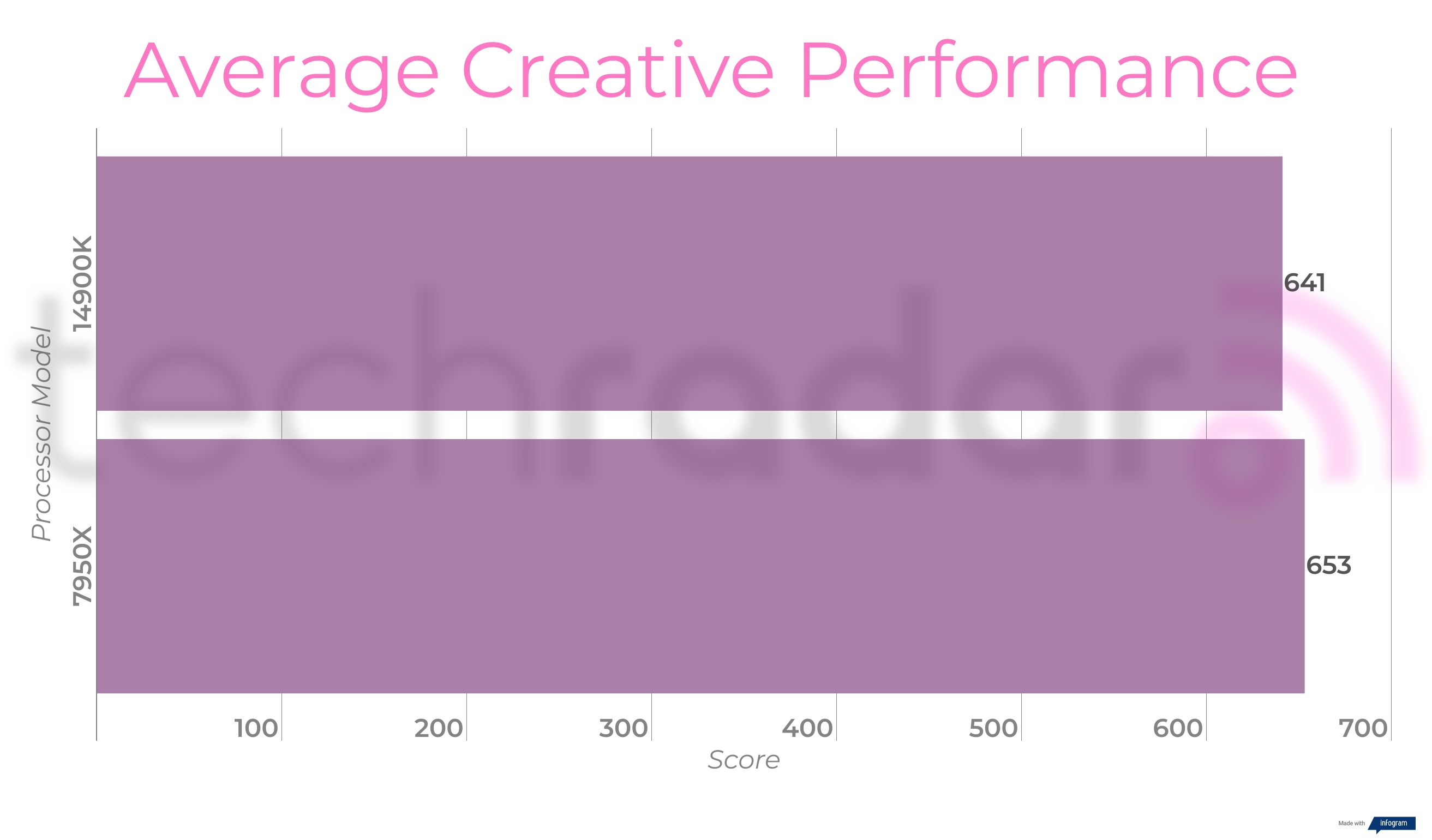
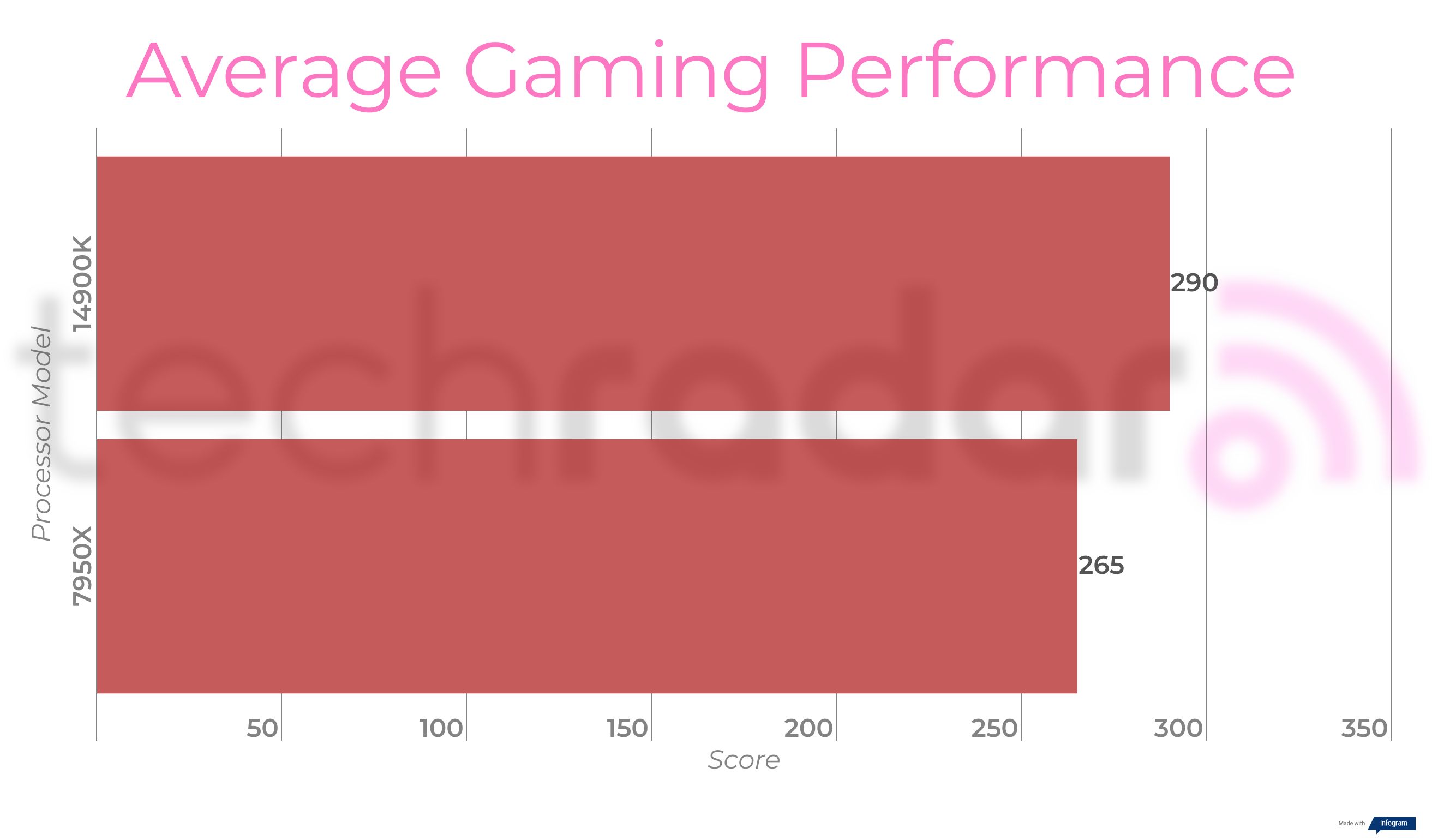
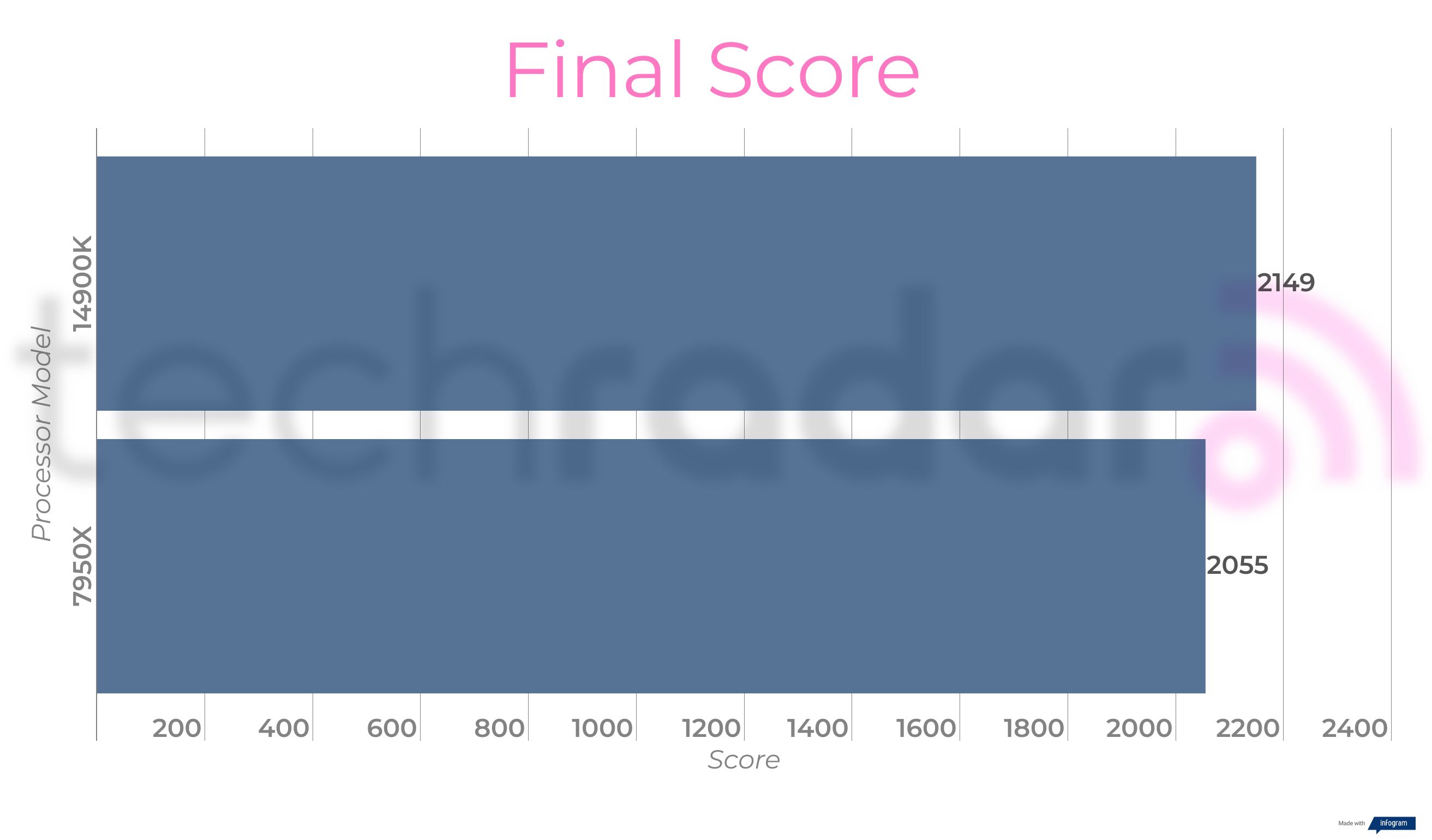
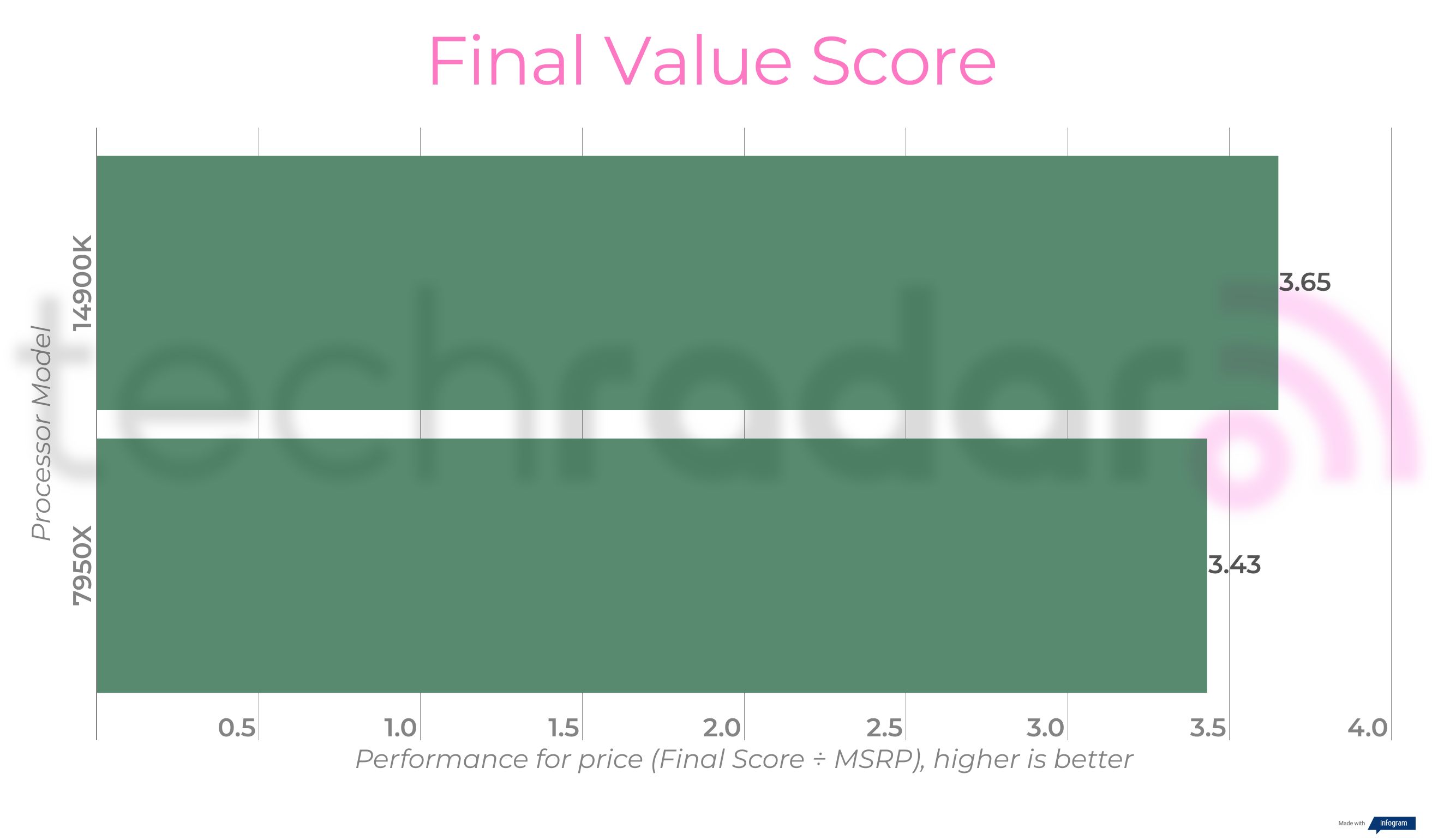
While the AMD Ryzen 9 7950X was a valiant performer particularly in terms of gaming, overall the Intel Core i9-14900K came out on top when looking at the averages for productivity, creativity, and gaming overall, not to mention higher single-core performance. Where things get tighter is the multi-core performance, where AMD’s flagship is just a hair off but wasn’t quite up to the task of dethroning Team Blue.
- Winner: Intel Core i9-14900K
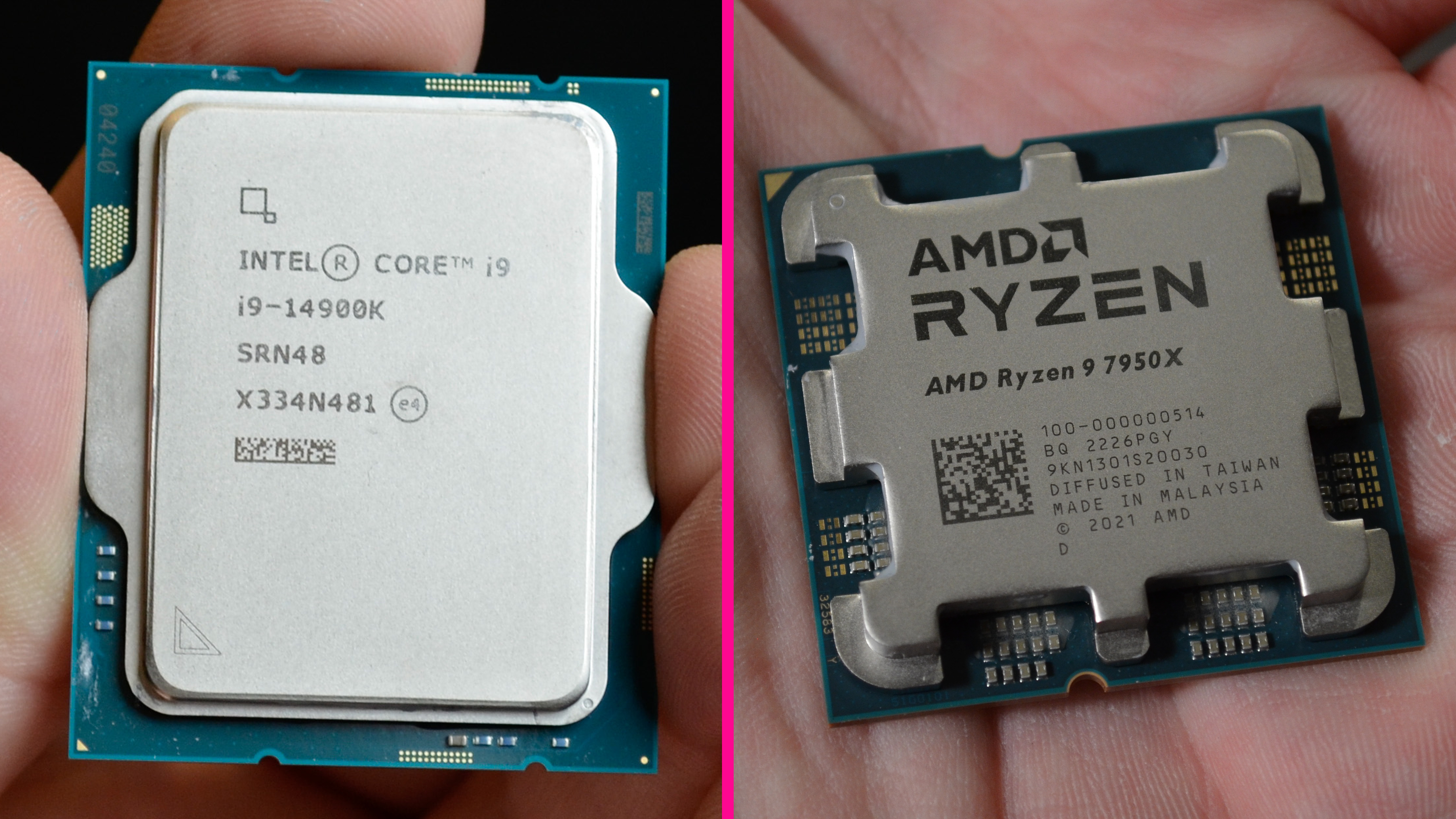
14900K vs 7950X: Final verdict
The battle of the 14900K vs 7950X is a close one but with a clear outcome for two different types of users. If you’re someone who is going to be using your PC for work and play, with a particular focus on demanding CPU processes then the Intel Core i9-14900K is the better choice based on our testing.
It all comes down to the third generation of the hybrid architecture with the latest iteration of P-cores and E-cores overthrowing the standard 16-cores and 32 threads of AMD’s model. With that said, the AMD Ryzen 9 7950X boasted significant advantages in terms of raw gaming performance with a staggering lead in CPU-bound titles as seen in our benchmarks. For a machine that’s purely geared around gaming, the 7950X could be the better choice of the two.
Both models are excellent choices if you’re wanting to build one of the best gaming PCs to pair with one of the best graphics cards available. However, based on everything we’ve seen in our testing, the Intel Core i9-14900K is the better all-rounder.

Formerly TechRadar Gaming's Hardware Editor, Aleksha McLoughlin is now a freelance writer and editor specializing in computing tech, video games, and E-commerce. As well as her many contributions to this site, you'll also find her work available on sister sites such as PC Gamer, GamesRadar, and Android Central. Additionally, more of her bylines can be found on Trusted Reviews, Dexerto, Expert Reviews, Techopedia, PC Guide, VideoGamer, and more.